
paperless-gpt
Use LLMs and LLM Vision (OCR) to handle paperless-ngx - Document Digitalization powered by AI
Stars: 1981
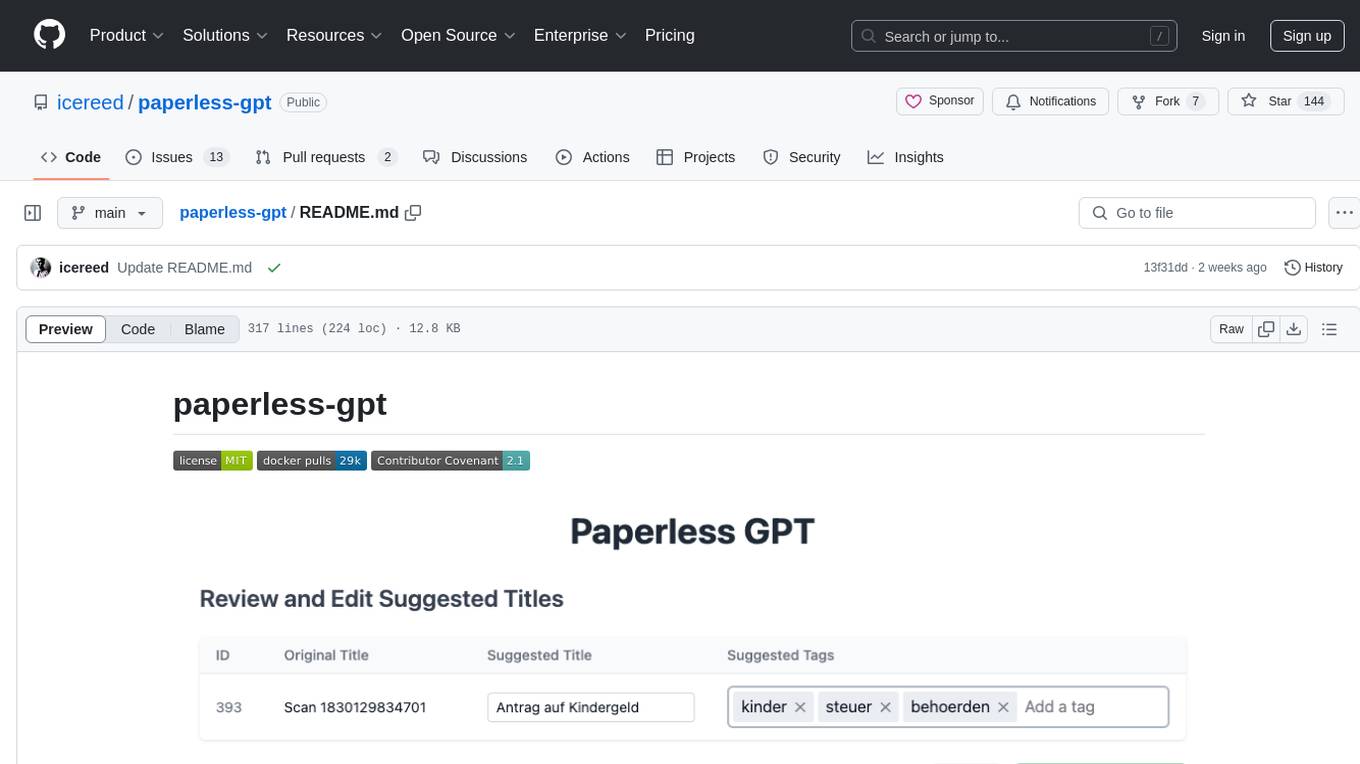
paperless-gpt is a tool designed to generate accurate and meaningful document titles and tags for paperless-ngx using Large Language Models (LLMs). It supports multiple LLM providers, including OpenAI and Ollama. With paperless-gpt, you can streamline your document management by automatically suggesting appropriate titles and tags based on the content of your scanned documents. The tool offers features like multiple LLM support, customizable prompts, easy integration with paperless-ngx, user-friendly interface for reviewing and applying suggestions, dockerized deployment, automatic document processing, and an experimental OCR feature.
README:
💡 Maintained by Icereed. Proudly supported by BubbleTax.de – automated, BMF-compliant tax reports for Interactive Brokers traders in Germany.
paperless-gpt seamlessly pairs with paperless-ngx to generate AI-powered document titles and tags, saving you hours of manual sorting. While other tools may offer AI chat features, paperless-gpt stands out by supercharging OCR with LLMs-ensuring high accuracy, even with tricky scans. If you're craving next-level text extraction and effortless document organization, this is your solution.
https://github.com/user-attachments/assets/bd5d38b9-9309-40b9-93ca-918dfa4f3fd4
❤️ Support This Project
If paperless-gpt is helping you organize your documents and saving you time, please consider sponsoring its development. Your support helps ensure continued improvements and maintenance!
-
LLM-Enhanced OCR
Harness Large Language Models (OpenAI or Ollama) for better-than-traditional OCR—turn messy or low-quality scans into context-aware, high-fidelity text. -
Use specialized AI OCR services
- LLM OCR: Use OpenAI or Ollama to extract text from images.
- Google Document AI: Leverage Google's powerful Document AI for OCR tasks.
- Azure Document Intelligence: Use Microsoft's enterprise OCR solution.
- Docling Server: Self-hosted OCR and document conversion service
-
Automatic Title, Tag & Created Date Generation
No more guesswork. Let the AI do the naming and categorizing. You can easily review suggestions and refine them if needed. -
Supports reasoning models in Ollama
Greatly enhance accuracy by using a reasoning model likeqwen3:8b. The perfect tradeoff between privacy and performance! Of course, if you got enough GPUs or NPUs, a bigger model will enhance the experience. -
Automatic Correspondent Generation
Automatically identify and generate correspondents from your documents, making it easier to track and organize your communications. -
Automatic Custom Field Generation
Extract and populate custom fields from your documents. Configure which fields to target and how they should be filled. This feature must be enabled in the settings, and you must select at least one custom field for it to function. Three write modes are available:- Append: This is the safest option: It only adds new fields that do not already exist on the document. It will never overwrite an existing field, even if it's empty.
- Update: Adds new fields and overwrites existing fields with new suggestions. Fields on the document that don't have a new suggestion are left untouched.
- Replace: Deletes all existing custom fields on the document and replaces them entirely with the suggested fields.
-
Searchable & Selectable PDFs
Generate PDFs with transparent text layers positioned accurately over each word, making your documents both searchable and selectable while preserving the original appearance. -
Extensive Customization
-
Customizable Prompts via Web UI: Tweak and manage all AI prompts for titles, tags, correspondents, and more directly within the web interface under the "Settings" menu. The application uses a safe
default_promptsandpromptsdirectory structure, ensuring your customizations are persistent. - Tagging: Decide how documents get tagged—manually, automatically, or via OCR-based flows.
- PDF Processing: Configure how OCR-enhanced PDFs are handled, with options to save locally or upload to paperless-ngx.
-
Customizable Prompts via Web UI: Tweak and manage all AI prompts for titles, tags, correspondents, and more directly within the web interface under the "Settings" menu. The application uses a safe
-
Simple Docker Deployment
A few environment variables, and you're off! Compose it alongside paperless-ngx with minimal fuss. -
Unified Web UI
- Manual Review: Approve or tweak AI's suggestions.
- Auto Processing: Focus only on edge cases while the rest is sorted for you.
-
Ad-hoc Document Analysis Perform ad-hoc analysis on a selection of documents using a custom prompt. Gain quick insights, summaries, or extract specific information from multiple documents at once.
- paperless-gpt
- Docker installed.
- A running instance of paperless-ngx.
- Access to an LLM provider:
-
OpenAI: An API key with models like
gpt-4oorgpt-3.5-turbo. -
Ollama: A running Ollama server with models like
qwen3:8b.
-
OpenAI: An API key with models like
Here's an example docker-compose.yml to spin up paperless-gpt alongside paperless-ngx:
services:
paperless-ngx:
image: ghcr.io/paperless-ngx/paperless-ngx:latest
# ... (your existing paperless-ngx config)
paperless-gpt:
# Use one of these image sources:
image: icereed/paperless-gpt:latest # Docker Hub
# image: ghcr.io/icereed/paperless-gpt:latest # GitHub Container Registry
environment:
PAPERLESS_BASE_URL: "http://paperless-ngx:8000"
PAPERLESS_API_TOKEN: "your_paperless_api_token"
PAPERLESS_PUBLIC_URL: "http://paperless.mydomain.com" # Optional
MANUAL_TAG: "paperless-gpt" # Optional, default: paperless-gpt
AUTO_TAG: "paperless-gpt-auto" # Optional, default: paperless-gpt-auto
# LLM Configuration - Choose one:
# Option 1: Standard OpenAI
LLM_PROVIDER: "openai"
LLM_MODEL: "gpt-4o"
OPENAI_API_KEY: "your_openai_api_key"
# Option 2: Mistral
# LLM_PROVIDER: "mistral"
# LLM_MODEL: "mistral-large-latest"
# MISTRAL_API_KEY: "your_mistral_api_key"
# Option 3: Azure OpenAI
# LLM_PROVIDER: "openai"
# LLM_MODEL: "your-deployment-name"
# OPENAI_API_KEY: "your_azure_api_key"
# OPENAI_API_TYPE: "azure"
# OPENAI_BASE_URL: "https://your-resource.openai.azure.com"
# Option 4: Ollama (Local)
# LLM_PROVIDER: "ollama"
# LLM_MODEL: "qwen3:8b"
# OLLAMA_HOST: "http://host.docker.internal:11434"
# OLLAMA_CONTEXT_LENGTH: "8192" # Sets Ollama NumCtx (context window)
# TOKEN_LIMIT: 1000 # Recommended for smaller models
# Option 5: Anthropic/Claude
# LLM_PROVIDER: "anthropic"
# LLM_MODEL: "claude-sonnet-4-5"
# ANTHROPIC_API_KEY: "your_anthropic_api_key"
# Optional LLM Settings
# LLM_LANGUAGE: "English" # Optional, default: English
# OCR Configuration - Choose one:
# Option 1: LLM-based OCR
OCR_PROVIDER: "llm" # Default OCR provider
VISION_LLM_PROVIDER: "ollama" # openai, ollama, mistral, or anthropic
VISION_LLM_MODEL: "minicpm-v" # minicpm-v (ollama) or gpt-4o (openai) or claude-sonnet-4-5 (anthropic/claude)
OLLAMA_HOST: "http://host.docker.internal:11434" # If using Ollama
# OCR Processing Mode
OCR_PROCESS_MODE: "image" # Optional, default: image, other options: pdf, whole_pdf
PDF_SKIP_EXISTING_OCR: "false" # Optional, skip OCR for PDFs with existing OCR
# Option 2: Google Document AI
# OCR_PROVIDER: 'google_docai' # Use Google Document AI
# GOOGLE_PROJECT_ID: 'your-project' # Your GCP project ID
# GOOGLE_LOCATION: 'us' # Document AI region
# GOOGLE_PROCESSOR_ID: 'processor-id' # Your processor ID
# GOOGLE_APPLICATION_CREDENTIALS: '/app/credentials.json' # Path to service account key
# Option 3: Azure Document Intelligence
# OCR_PROVIDER: 'azure' # Use Azure Document Intelligence
# AZURE_DOCAI_ENDPOINT: 'your-endpoint' # Your Azure endpoint URL
# AZURE_DOCAI_KEY: 'your-key' # Your Azure API key
# AZURE_DOCAI_MODEL_ID: 'prebuilt-read' # Optional, defaults to prebuilt-read
# AZURE_DOCAI_TIMEOUT_SECONDS: '120' # Optional, defaults to 120 seconds
# AZURE_DOCAI_OUTPUT_CONTENT_FORMAT: 'text' # Optional, defaults to 'text', other valid option is 'markdown'
# 'markdown' requires the 'prebuilt-layout' model
# Enhanced OCR Features
CREATE_LOCAL_HOCR: "false" # Optional, save hOCR files locally
LOCAL_HOCR_PATH: "/app/hocr" # Optional, path for hOCR files
CREATE_LOCAL_PDF: "false" # Optional, save enhanced PDFs locally
LOCAL_PDF_PATH: "/app/pdf" # Optional, path for PDF files
PDF_UPLOAD: "false" # Optional, upload enhanced PDFs to paperless-ngx
PDF_REPLACE: "false" # Optional and DANGEROUS, delete original after upload
PDF_COPY_METADATA: "true" # Optional, copy metadata from original document
PDF_OCR_TAGGING: "true" # Optional, add tag to processed documents
PDF_OCR_COMPLETE_TAG: "paperless-gpt-ocr-complete" # Optional, tag name
# Option 4: Docling Server
# OCR_PROVIDER: 'docling' # Use a Docling server
# DOCLING_URL: 'http://your-docling-server:port' # URL of your Docling instance
# DOCLING_IMAGE_EXPORT_MODE: "placeholder" # Optional, defaults to "embedded"
# DOCLING_OCR_PIPELINE: "standard" # Optional, defaults to "vlm"
# DOCLING_OCR_ENGINE: "easyocr" # Optional, defaults to "easyocr" (only used when `DOCLING_OCR_PIPELINE is set to 'standard')
AUTO_OCR_TAG: "paperless-gpt-ocr-auto" # Optional, default: paperless-gpt-ocr-auto
OCR_LIMIT_PAGES: "5" # Optional, default: 5. Set to 0 for no limit.
LOG_LEVEL: "info" # Optional: debug, warn, error
volumes:
- ./prompts:/app/prompts # Mount the prompts directory
# For Google Document AI:
- ${HOME}/.config/gcloud/application_default_credentials.json:/app/credentials.json
# For local hOCR and PDF saving:
- ./hocr:/app/hocr # Only if CREATE_LOCAL_HOCR is true
- ./pdf:/app/pdf # Only if CREATE_LOCAL_PDF is true
ports:
- "8080:8080"
depends_on:
- paperless-ngxPro Tip: Replace placeholders with real values and read the logs if something looks off.
-
Clone the Repository
git clone https://github.com/icereed/paperless-gpt.git cd paperless-gpt -
Create a
promptsDirectorymkdir prompts
-
Build the Docker Image
docker build -t paperless-gpt . -
Run the Container
docker run -d \ -e PAPERLESS_BASE_URL='http://your_paperless_ngx_url' \ -e PAPERLESS_API_TOKEN='your_paperless_api_token' \ -e LLM_PROVIDER='openai' \ -e LLM_MODEL='gpt-4o' \ -e OPENAI_API_KEY='your_openai_api_key' \ -e LLM_LANGUAGE='English' \ -e VISION_LLM_PROVIDER='ollama' \ -e VISION_LLM_MODEL='minicpm-v' \ -e LOG_LEVEL='info' \ -v $(pwd)/prompts:/app/prompts \ -p 8080:8080 \ paperless-gpt
For detailed provider-specific documentation:
paperless-gpt supports four different OCR providers, each with unique strengths and capabilities:
-
Key Features:
- Uses vision-capable LLMs like gpt-4o or MiniCPM-V
- High accuracy with complex layouts and difficult scans
- Context-aware text recognition
- Self-correcting capabilities for OCR errors
-
Best For:
- Complex or unusual document layouts
- Poor quality scans
- Documents with mixed languages
-
Configuration:
OCR_PROVIDER: "llm" VISION_LLM_PROVIDER: "openai" # or "ollama" VISION_LLM_MODEL: "gpt-4o" # or "minicpm-v"
-
Key Features:
- Enterprise-grade OCR solution
- Prebuilt models for common document types
- Layout preservation and table detection
- Fast processing speeds
-
Best For:
- Business documents and forms
- High-volume processing
- Documents requiring layout analysis
-
Configuration:
OCR_PROVIDER: "azure" AZURE_DOCAI_ENDPOINT: "https://your-endpoint.cognitiveservices.azure.com/" AZURE_DOCAI_KEY: "your-key" AZURE_DOCAI_MODEL_ID: "prebuilt-read" # optional AZURE_DOCAI_TIMEOUT_SECONDS: "120" # optional AZURE_DOCAI_OUTPUT_CONTENT_FORMAT: "text" # optional, defaults to text, other valid option is 'markdown' # 'markdown' requires the 'prebuilt-layout' model
-
Key Features:
- Enterprise-grade OCR/HTR solution
- Specialized document processors
- Strong form field detection
- Multi-language support
- High accuracy on structured documents
- Exclusive hOCR generation for creating searchable PDFs with text layers
- Only provider that supports enhanced PDF generation features
-
Best For:
- Forms and structured documents
- Documents with tables
- Multi-language documents
- Handwritten text (HTR)
-
Configuration:
OCR_PROVIDER: "google_docai" GOOGLE_PROJECT_ID: "your-project" GOOGLE_LOCATION: "us" GOOGLE_PROCESSOR_ID: "processor-id" CREATE_LOCAL_HOCR: "true" # Optional, for hOCR generation LOCAL_HOCR_PATH: "/app/hocr" # Optional, default path CREATE_LOCAL_PDF: "true" # Optional, for applying OCR to PDF LOCAL_PDF_PATH: "/app/pdf" # Optional, default path
-
Key Features:
- Self-hosted OCR and document conversion service
- Supports various input and output formats (including text)
- Utilizes multiple OCR engines (EasyOCR, Tesseract, etc.)
- Can be run locally or in a private network
-
Best For:
- Users who prefer a self-hosted solution
- Environments where data privacy is paramount
- Processing a wide variety of document types
-
Configuration:
OCR_PROVIDER: "docling" DOCLING_URL: "http://your-docling-server:port" DOCLING_IMAGE_EXPORT_MODE: "placeholder" # Optional, defaults to "embedded" DOCLING_OCR_PIPELINE: "standard" # Optional, defaults to "vlm" DOCLING_OCR_ENGINE: "macocr" # Optional, defaults to "easyocr" (only used when `DOCLING_OCR_PIPELINE is set to 'standard')
paperless-gpt offers different methods for processing documents, giving you flexibility based on your needs and OCR provider capabilities:
- How it works: Converts PDF pages to images before processing
- Best for: Compatibility with all OCR providers.
-
Configuration:
OCR_PROCESS_MODE: "image"
- How it works: Processes PDF pages directly without image conversion
- Best for: Preserving PDF features, potentially faster processing and improved accuracy with some providers
-
Configuration:
OCR_PROCESS_MODE: "pdf"
- How it works: Processes the entire PDF document in a single operation
- Best for: Providers that handle multi-page documents efficiently, reduced API calls
-
Configuration:
OCR_PROCESS_MODE: "whole_pdf" -
Note: Processing large PDFs may cause you to hit the API limit of your OCR provider. If you encounter problems with large documents, consider switching to
pdfmode, which processes pages individually.
Different OCR providers support different processing modes:
| Provider | Image Mode | PDF Mode | Whole PDF Mode |
|---|---|---|---|
| LLM-based OCR (OpenAI/Ollama) | ✅ | ❌ | ❌ |
| Azure Document Intelligence | ✅ | ❌ | ❌ |
| Google Document AI | ✅ | ✅ | ✅ |
| Mistral OCR | ✅ | ✅ | ✅ |
| Docling Server | ✅ | ✅ | ✅ |
Important: paperless-gpt will validate your configuration at startup and prevent unsupported mode/provider combinations. If you specify an unsupported mode for your provider, the application will fail to start with a clear error message.
When using PDF or whole PDF modes, you can enable automatic detection of existing OCR:
environment:
OCR_PROCESS_MODE: "pdf" # or "whole_pdf"
PDF_SKIP_EXISTING_OCR: "true" # Skip processing if existing OCR is detected in the PDFNote: Not all OCR providers support all processing modes. Some may work better with certain modes than others. Processing as PDF might use more or fewer API tokens than processing as images, depending on the provider. Results may vary based on document complexity and provider capabilities. It's recommended to experiment with different modes to find what works best for your specific documents and OCR provider.
paperless-gpt includes powerful OCR enhancements that go beyond basic text extraction:
Important Note: The PDF text layer generation and hOCR features are currently only supported with Google Document AI as the OCR provider. These features are not available when using LLM-based OCR or Azure Document Intelligence.
- Searchable & Selectable PDFs: Creates PDFs with transparent text overlays accurately positioned over each word in the document
- hOCR Integration: Utilizes hOCR format (HTML-based OCR representation) to maintain precise text positioning
- Document Quality Improvement: Makes documents both searchable and selectable while preserving the original appearance
- Google Document AI Required: These features rely on Google Document AI's ability to generate hOCR data with accurate word positions
paperless-gpt can save both the hOCR files and enhanced PDFs locally:
environment:
# Enable local file saving
CREATE_LOCAL_HOCR: "true" # Save hOCR files locally
CREATE_LOCAL_PDF: "true" # Save generated PDFs locally
LOCAL_HOCR_PATH: "/app/hocr" # Path to save hOCR files
LOCAL_PDF_PATH: "/app/pdf" # Path to save PDF files
volumes:
# Mount volumes to access the files from your host
- ./hocr_files:/app/hocr
- ./pdf_files:/app/pdfNote: You must mount these directories as volumes in your Docker configuration to access the generated files from your host system.
Due to limitations in paperless-ngx's API, it's not possible to directly update existing documents with their OCR-enhanced versions. As a workaround, paperless-gpt can:
- Upload the enhanced PDF as a new document
- Copy metadata from the original document to the new one
- Optionally delete the original document
environment:
# PDF upload configuration
PDF_UPLOAD: "true" # Upload processed PDFs to paperless-ngx
PDF_COPY_METADATA: "true" # Copy metadata from original to new document
PDF_REPLACE: "false" # Whether to delete the original document (use with caution!)
PDF_OCR_TAGGING: "true" # Add a tag to mark documents as OCR-processed
PDF_OCR_COMPLETE_TAG: "paperless-gpt-ocr-complete" # Tag used to mark OCR-processed documents
⚠️ WARNING⚠️
SettingPDF_REPLACE: "true"will delete the original document after uploading the enhanced version. This process cannot be undone and may result in data loss if something goes wrong during the upload or metadata copying process. Use with extreme caution!
When copying metadata from the original document to the new one, paperless-gpt attempts to copy:
- Document title
- Tags (including adding the OCR complete tag)
- Correspondent information
- Created date
However, some metadata cannot be copied due to paperless-ngx API limitations:
- Document ID (new document always gets a new ID)
- Added date (will reflect the current upload date)
- Modified date
- Custom fields that might be added by other paperless-ngx plugins
- Notes and annotations
To prevent accidental creation of incomplete documents, paperless-gpt includes several safety features:
-
Page Count Check: If using
OCR_LIMIT_PAGESto process only a subset of pages (for speed or resource reasons), PDF generation will be skipped entirely if fewer pages would be processed than exist in the original document.
environment:
OCR_LIMIT_PAGES: "5" # Limit OCR to first 5 pages, set to 0 for no limit-
OCR Complete Tagging: Documents that have been fully processed with OCR can be automatically tagged with a special tag, preventing duplicate processing.
-
Processing Skip: If a document already has the OCR complete tag, processing will be skipped automatically.
For best results with the enhanced OCR features:
-
Initial Testing: Start with
PDF_REPLACE: "false"until you've confirmed the process works well with your documents. -
Regular Backups: Ensure you have backups of your paperless-ngx database and documents before enabling document replacement.
-
Process Management: For large documents, consider using
OCR_LIMIT_PAGES: "0"to ensure all pages are processed, even though this will take longer. -
Local Copies: Enable local file saving (
CREATE_LOCAL_HOCRandCREATE_LOCAL_PDF) to keep copies of the enhanced files as an extra precaution. -
Tagging Strategy: Use the OCR complete tag (
PDF_OCR_COMPLETE_TAG) to track which documents have already been processed.
Note: When using Ollama, ensure that the Ollama server is running and accessible from the paperless-gpt container.
| Variable | Description | Required | Default |
|---|---|---|---|
PAPERLESS_BASE_URL |
URL of your paperless-ngx instance (e.g. http://paperless-ngx:8000). |
Yes | |
PAPERLESS_API_TOKEN |
API token for paperless-ngx. Generate one in paperless-ngx admin. | Yes | |
PAPERLESS_PUBLIC_URL |
Public URL for Paperless (if different from PAPERLESS_BASE_URL). |
No | |
MANUAL_TAG |
Tag for manual processing. | No | paperless-gpt |
AUTO_TAG |
Tag for auto processing. | No | paperless-gpt-auto |
LLM_PROVIDER |
AI backend (openai, ollama, googleai, mistral, or anthropic). |
Yes | |
LLM_MODEL |
AI model name (e.g., gpt-4o, mistral-large-latest, qwen3:8b, claude-sonnet-4-5). |
Yes | |
OPENAI_API_KEY |
OpenAI API key (required if using OpenAI). | Cond. | |
MISTRAL_API_KEY |
Mistral API key (required if using Mistral). | Cond. | |
ANTHROPIC_API_KEY |
Anthropic API key (required if using Anthropic/Claude). | Cond. | |
OPENAI_API_TYPE |
Set to azure to use Azure OpenAI Service. |
No | |
OPENAI_BASE_URL |
Base URL for OpenAI API. For Azure OpenAI, set to your deployment URL (e.g., https://your-resource.openai.azure.com). |
No | |
LLM_LANGUAGE |
Likely language for documents (e.g. English). Appears in the prompt to help the LLM. |
No | English |
GOOGLEAI_API_KEY |
Google Gemini API key (required if using LLM_PROVIDER=googleai). |
Cond. | |
GOOGLEAI_THINKING_BUDGET |
(Optional, googleai only) Integer. Controls Gemini "thinking" budget. If unset, model default is used (thinking enabled if supported). Set to 0 to disable thinking (if model supports it). |
No | |
OLLAMA_HOST |
Ollama server URL (e.g. http://host.docker.internal:11434). |
No | |
LLM_REQUESTS_PER_MINUTE |
Maximum requests per minute for the main LLM. Useful for managing API costs or local LLM load. | No | 120 |
LLM_MAX_RETRIES |
Maximum retry attempts for failed main LLM requests. | No | 3 |
LLM_BACKOFF_MAX_WAIT |
Maximum wait time between retries for the main LLM (e.g., 30s). |
No | 30s |
OCR_PROVIDER |
OCR provider to use (llm, azure, or google_docai). |
No | llm |
OCR_PROCESS_MODE |
Method for processing documents: image (convert to images first), pdf (process PDF pages directly), or whole_pdf (entire PDF at once). |
No | image |
VISION_LLM_PROVIDER |
AI backend for LLM OCR (openai, ollama, mistral, or anthropic). Required if OCR_PROVIDER is llm. |
Cond. | |
VISION_LLM_MODEL |
Model name for LLM OCR (e.g. minicpm-v). Required if OCR_PROVIDER is llm. |
Cond. | |
VISION_LLM_REQUESTS_PER_MINUTE |
Maximum requests per minute for the Vision LLM. Useful for managing API costs or local LLM load. | No | 120 |
VISION_LLM_MAX_RETRIES |
Maximum retry attempts for failed Vision LLM requests. | No | 3 |
VISION_LLM_BACKOFF_MAX_WAIT |
Maximum wait time between retries for the Vision LLM (e.g., 30s). |
No | 30s |
VISION_LLM_MAX_TOKENS |
Maximum tokens for Vision LLM OCR output. | No | |
VISION_LLM_TEMPERATURE |
Sampling temperature for Vision OCR generation. Lower is more deterministic. Important: For OpenAI GPT-5 it must be explicitly set to 1.0. |
No | |
OLLAMA_CONTEXT_LENGTH |
(Ollama only) Integer. Sets NumCtx (context window) for the Ollama runner. If unset or 0, the model default is used. | No | |
OLLAMA_OCR_TOP_K |
(Ollama only) Top-k token sampling for Vision OCR. Lower favors more likely tokens; higher increases diversity. | No | |
AZURE_DOCAI_ENDPOINT |
Azure Document Intelligence endpoint. Required if OCR_PROVIDER is azure. |
Cond. | |
AZURE_DOCAI_KEY |
Azure Document Intelligence API key. Required if OCR_PROVIDER is azure. |
Cond. | |
AZURE_DOCAI_MODEL_ID |
Azure Document Intelligence model ID. Optional if using azure provider. |
No | prebuilt-read |
AZURE_DOCAI_TIMEOUT_SECONDS |
Azure Document Intelligence timeout in seconds. | No | 120 |
AZURE_DOCAI_OUTPUT_CONTENT_FORMAT |
Azure Document Intelligence output content format. Optional if using azure provider. Defaults to text. 'markdown' is the other option and it requires the 'prebuild-layout' model ID. |
No | text |
GOOGLE_PROJECT_ID |
Google Cloud project ID. Required if OCR_PROVIDER is google_docai. |
Cond. | |
GOOGLE_LOCATION |
Google Cloud region (e.g. us, eu). Required if OCR_PROVIDER is google_docai. |
Cond. | |
GOOGLE_PROCESSOR_ID |
Document AI processor ID. Required if OCR_PROVIDER is google_docai. |
Cond. | |
GOOGLE_APPLICATION_CREDENTIALS |
Path to the mounted Google service account key. Required if OCR_PROVIDER is google_docai. |
Cond. | |
DOCLING_URL |
URL of the Docling server instance. Required if OCR_PROVIDER is docling. |
Cond. | |
DOCLING_IMAGE_EXPORT_MODE |
Mode for image export. Optional; defaults to embedded if unset. |
No | embedded |
DOCLING_OCR_PIPELINE |
Sets the pipeline type. Optional; defaults to vlm if unset. |
No | vlm |
DOCLING_OCR_ENGINE |
Sets the ocr engine, if DOCLING_OCR_PIPELINE is set to standard. Optional; defaults to easyocr
|
No | easyocr |
CREATE_LOCAL_HOCR |
Whether to save hOCR files locally. | No | false |
LOCAL_HOCR_PATH |
Path where hOCR files will be saved when hOCR generation is enabled. | No | /app/hocr |
CREATE_LOCAL_PDF |
Whether to save enhanced PDFs locally. | No | false |
LOCAL_PDF_PATH |
Path where PDF files will be saved when PDF generation is enabled. | No | /app/pdf |
PDF_UPLOAD |
Whether to upload enhanced PDFs to paperless-ngx. | No | false |
PDF_REPLACE |
Whether to delete the original document after uploading the enhanced version (DANGEROUS). | No | false |
PDF_COPY_METADATA |
Whether to copy metadata from the original document to the uploaded PDF. Only applicable when using PDF_UPLOAD. | No | true |
PDF_OCR_TAGGING |
Whether to add a tag to mark documents as OCR-processed. | No | true |
PDF_OCR_COMPLETE_TAG |
Tag used to mark documents as OCR-processed. | No | paperless-gpt-ocr-complete |
PDF_SKIP_EXISTING_OCR |
Whether to skip OCR processing for PDFs that already have OCR. Works with pdf and whole_pdf processing modes (OCR_PROCESS_MODE). |
No | false |
AUTO_OCR_TAG |
Tag for automatically processing docs with OCR. | No | paperless-gpt-ocr-auto |
OCR_LIMIT_PAGES |
Limit the number of pages for OCR. Set to 0 for no limit. |
No | 5 |
LOG_LEVEL |
Application log level (info, debug, warn, error). |
No | info |
LISTEN_INTERFACE |
Network interface to listen on. | No | 8080 |
AUTO_GENERATE_TITLE |
Generate titles automatically if paperless-gpt-auto is used. |
No | true |
AUTO_GENERATE_TAGS |
Generate tags automatically if paperless-gpt-auto is used. |
No | true |
AUTO_GENERATE_CORRESPONDENTS |
Generate correspondents automatically if paperless-gpt-auto is used. |
No | true |
AUTO_GENERATE_DOCUMENT_TYPE |
Generate document types automatically if paperless-gpt-auto is used. Only existing document types from paperless-ngx will be used. |
No | true |
AUTO_GENERATE_CREATED_DATE |
Generate the created dates automatically if paperless-gpt-auto is used. |
No | true |
TOKEN_LIMIT |
Maximum tokens allowed for prompts/content. Set to 0 to disable limit. Useful for smaller LLMs. |
No | |
IMAGE_MAX_PIXEL_DIMENSION |
Maximum pixels along any side when rendering document pages to images. | No | 10000 |
IMAGE_MAX_TOTAL_PIXELS |
Maximum total pixel count (width × height) when rendering document pages to images. | No | 40000000 |
IMAGE_MAX_RENDER_DPI |
Maximum DPI used when rendering document pages to images. | No | 600 |
IMAGE_MAX_FILE_BYTES |
Maximum JPEG file size in bytes for rendered page images. Images exceeding this are compressed or resized. | No | 10485760 |
CORRESPONDENT_BLACK_LIST |
A comma-separated list of names to exclude from the correspondents suggestions. Example: John Doe, Jane Smith. |
No |
paperless-gpt's flexible prompt templates let you shape how AI responds. While you can still manually manage files, the recommended way to customize prompts is through the Settings page in the web UI.
The application uses two directories for management:
-
default_prompts/: Contains the built-in, default templates. These should not be modified. -
prompts/: Your working directory. On first run, the default templates are copied here. All edits made in the UI are saved to the files in this directory.
To ensure your custom prompts persist across container restarts, you must mount the prompts directory as a volume in your docker-compose.yml:
volumes:
# This is crucial to save your custom prompts!
- ./prompts:/app/promptsThe application reloads the templates instantly after you save them in the UI and also on startup, so no restart is needed to apply changes.
Each template has access to specific variables:
title_prompt.tmpl:
-
{{.Language}}- Target language (e.g., "English") -
{{.Content}}- Document content text -
{{.Title}}- Original document title
tag_prompt.tmpl:
-
{{.Language}}- Target language -
{{.AvailableTags}}- List of existing tags in paperless-ngx -
{{.OriginalTags}}- Document's current tags -
{{.Title}}- Document title -
{{.Content}}- Document content text
ocr_prompt.tmpl:
-
{{.Language}}- Target language
correspondent_prompt.tmpl:
-
{{.Language}}- Target language -
{{.AvailableCorrespondents}}- List of existing correspondents -
{{.BlackList}}- List of blacklisted correspondent names -
{{.Title}}- Document title -
{{.Content}}- Document content text
created_date_prompt.tmpl:
-
{{.Language}}- Target language -
{{.Content}}- Document content text
custom_field_prompt.tmpl:
-
{{.DocumentType}}- The name of the document's type in paperless-ngx. -
{{.CustomFieldsXML}}- An XML string listing the custom fields selected in the settings for processing. -
{{.Title}}- Document title -
{{.CreatedDate}}- Document's created date -
{{.Content}}- Document content text
The templates use Go's text/template syntax. paperless-gpt automatically reloads template changes after UI saves and on startup.
Click to expand the vanilla OCR vs. AI-powered OCR comparison
Image:
Vanilla Paperless-ngx OCR:
La Grande Recre
Gentre Gommercial 1'Esplanade
1349 LOLNAIN LA NEWWE
TA BERBOGAAL Tel =. 010 45,96 12
Ticket 1440112 03/11/2006 a 13597:
4007176614518. DINOS. TYRAMNESA
TOTAET.T.LES
ReslE par Lask-Euron
Rencu en Cash Euro
V.14.6 -Hotgese = VALERTE
TICKET A-GONGERVER PORR TONT. EEHANGE
HERET ET A BIENTOT
LLM-Powered OCR (OpenAI gpt-4o):
La Grande Récré
Centre Commercial l'Esplanade
1348 LOUVAIN LA NEUVE
TVA 860826401 Tel : 010 45 95 12
Ticket 14421 le 03/11/2006 à 15:27:18
4007176614518 DINOS TYRANNOSA 14.90
TOTAL T.T.C. 14.90
Réglé par Cash Euro 50.00
Rendu en Cash Euro 35.10
V.14.6 Hôtesse : VALERIE
TICKET A CONSERVER POUR TOUT ECHANGE
MERCI ET A BIENTOT
Image:
Vanilla Paperless-ngx OCR:
Invoice Number: 1-996-84199
Fed: Invoica Date: Sep01, 2014
Accaunt Number: 1334-8037-4
Page: 1012
Fod£x Tax ID 71.0427007
IRISINC
SHARON ANDERSON
4731 W ATLANTIC AVE STE BI
DELRAY BEACH FL 33445-3897 ’ a
Invoice Questions?
Bing, ‚Account Shipping Address: Contact FedEx Reı
ISINC
4731 W ATLANTIC AVE Phone: (800) 622-1147 M-F 7-6 (CST)
DELRAY BEACH FL 33445-3897 US Fax: (800) 548-3020
Internet: www.fedex.com
Invoice Summary Sep 01, 2014
FodEx Ground Services
Other Charges 11.00
Total Charges 11.00 Da £
>
polo) Fz// /G
TOTAL THIS INVOICE .... usps 11.00 P 2/1 f
‘The only charges accrued for this period is the Weekly Service Charge.
The Fedix Ground aceounts teferencedin his involce have been transteired and assigned 10, are owned by,andare payable to FedEx Express:
To onsurs propor credit, plasa raturn this portion wirh your payment 10 FodEx
‚Please do not staple or fold. Ploase make your chack payablı to FedEx.
[TI For change ol address, hc har and camphat lrm or never ide
Remittance Advice
Your payment is due by Sep 16, 2004
Number Number Dus
1334803719968 41993200000110071
AT 01 0391292 468448196 A**aDGT
IRISINC Illallun elalalssollallansdHilalellund
SHARON ANDERSON
4731 W ATLANTIC AVE STEBI FedEx
DELRAY BEACH FL 334453897 PO. Box 94516
PALATINE IL 60094-4515
LLM-Powered OCR (OpenAI gpt-4o):
FedEx. Invoice Number: 1-996-84199
Invoice Date: Sep 01, 2014
Account Number: 1334-8037-4
Page: 1 of 2
FedEx Tax ID: 71-0427007
I R I S INC
SHARON ANDERSON
4731 W ATLANTIC AVE STE B1
DELRAY BEACH FL 33445-3897
Invoice Questions?
Billing Account Shipping Address: Contact FedEx Revenue Services
I R I S INC Phone: (800) 622-1147 M-F 7-6 (CST)
4731 W ATLANTIC AVE Fax: (800) 548-3020
DELRAY BEACH FL 33445-3897 US Internet: www.fedex.com
Invoice Summary Sep 01, 2014
FedEx Ground Services
Other Charges 11.00
Total Charges .......................................................... USD $ 11.00
TOTAL THIS INVOICE .............................................. USD $ 11.00
The only charges accrued for this period is the Weekly Service Charge.
RECEIVED
SEP _ 8 REC'D
BY: _
posted 9/21/14
The FedEx Ground accounts referenced in this invoice have been transferred and assigned to, are owned by, and are payable to FedEx Express.
To ensure proper credit, please return this portion with your payment to FedEx.
Please do not staple or fold. Please make your check payable to FedEx.
❑ For change of address, check here and complete form on reverse side.
Remittance Advice
Your payment is due by Sep 16, 2004
Invoice
Number
1-996-84199
Account
Number
1334-8037-4
Amount
Due
USD $ 11.00
133480371996841993200000110071
AT 01 031292 468448196 A**3DGT
I R I S INC
SHARON ANDERSON
4731 W ATLANTIC AVE STE B1
DELRAY BEACH FL 33445-3897
FedEx
P.O. Box 94515
Why Does It Matter?
- Traditional OCR often jumbles text from complex or low-quality scans.
- Large Language Models interpret context and correct likely errors, producing results that are more precise and readable.
- You can integrate these cleaned-up texts into your paperless-ngx pipeline for better tagging, searching, and archiving.
- Vanilla OCR typically uses classical methods or Tesseract-like engines to extract text, which can result in garbled outputs for complex fonts or poor-quality scans.
- LLM-Powered OCR uses your chosen AI backend—OpenAI or Ollama—to interpret the image's text in a more context-aware manner. This leads to fewer errors and more coherent text.
- Google Document AI and Azure Document Intelligence provide high-accuracy OCR with advanced layout analysis.
- Enhanced PDF Generation combines OCR results with the original document to create searchable PDFs with properly positioned text layers.
-
Tag Documents
- Add
paperless-gpttag to documents for manual processing - Add
paperless-gpt-autofor automatic processing - Add
paperless-gpt-ocr-autofor automatic OCR processing
- Add
-
Visit Web UI
- Go to
http://localhost:8080(or your host) in your browser - Review documents tagged for processing
- Go to
-
Generate & Apply Suggestions
- Click "Generate Suggestions" to see AI-proposed titles/tags/correspondents
- Review and approve or edit suggestions
- Click "Apply" to save changes to paperless-ngx
-
OCR Processing
- Tag documents with appropriate OCR tag to process them
- If enhanced PDF features are enabled, documents will be processed accordingly:
- For local file saving, check the configured directories for output files
- For PDF uploads, new documents will appear in paperless-ngx with copied metadata
- Monitor progress in the Web UI
- Review results and apply changes
When using local LLMs (like those through Ollama), you might need to adjust certain settings to optimize performance:
- Use
TOKEN_LIMITenvironment variable to control the maximum number of tokens sent to the LLM - For Ollama, set
OLLAMA_CONTEXT_LENGTHto control the model's context window (NumCtx). This is independent ofTOKEN_LIMITand configures the server-side KV cache size. If unset or 0, the model default is used. Choose a value within the model's supported window (e.g., 8192). - Smaller models might truncate content unexpectedly if given too much text
- Start with a conservative limit (e.g., 1000 tokens) and adjust based on your model's capabilities
- Set to
0to disable the limit (use with caution)
Example configuration for smaller models:
environment:
TOKEN_LIMIT: "2000" # Adjust based on your model's context window
OLLAMA_CONTEXT_LENGTH: "4096" # Controls Ollama NumCtx (context window); if unset, model default is used
LLM_PROVIDER: "ollama"
LLM_MODEL: "qwen3:8b" # Or other local modelCommon issues and solutions:
- If you see truncated or incomplete responses, try lowering the
TOKEN_LIMIT - On Ollama, if you hit "context length exceeded" or memory issues, reduce
OLLAMA_CONTEXT_LENGTHor choose a smaller model/context size. - If processing is too limited, gradually increase the limit while monitoring performance
- For models with larger context windows, you can increase the limit or disable it entirely
- If PDFs aren't being generated, check that
OCR_LIMIT_PAGESisn't set too low compared to your document page count - Ensure volumes are properly mounted if using
CREATE_LOCAL_PDForCREATE_LOCAL_HOCR - When using
PDF_REPLACE: "true", verify you have recent backups of your paperless-ngx data
- Feature Not Working: If custom field suggestions are not being generated even though the feature is enabled, ensure you have selected at least one custom field in the settings. The feature requires at least one field to be selected to know what to process.
Pull requests and issues are welcome!
- Fork the repo
- Create a branch (
feature/my-awesome-update) - Commit changes (
git commit -m "Improve X") - Open a PR
Check out our contributing guidelines for details.
If paperless-gpt is saving you time and making your document management easier, please consider supporting its continued development:
- GitHub Sponsors: Help fund ongoing development and maintenance
- Share your success stories and use cases
- Star the project on GitHub
- Contribute code, documentation, or bug reports
Your support helps ensure paperless-gpt remains actively maintained and continues to improve!
This project is fully open-source and will remain free to use.
It's maintained by Icereed, with partial support from my other project:
👉 BubbleTax.de — automated tax reports for IBKR traders in Germany.
If you're a developer who also trades, check it out. If not – no worries 😊
paperless-gpt is licensed under the MIT License. Feel free to adapt and share!
This project is not officially affiliated with paperless-ngx. Use at your own risk.
paperless-gpt: The LLM-based companion your doc management has been waiting for. Enjoy effortless, intelligent document titles, tags, and next-level OCR.
For Tasks:
Click tags to check more tools for each tasksFor Jobs:
Alternative AI tools for paperless-gpt
Similar Open Source Tools

paperless-gpt
paperless-gpt is a tool designed to generate accurate and meaningful document titles and tags for paperless-ngx using Large Language Models (LLMs). It supports multiple LLM providers, including OpenAI and Ollama. With paperless-gpt, you can streamline your document management by automatically suggesting appropriate titles and tags based on the content of your scanned documents. The tool offers features like multiple LLM support, customizable prompts, easy integration with paperless-ngx, user-friendly interface for reviewing and applying suggestions, dockerized deployment, automatic document processing, and an experimental OCR feature.
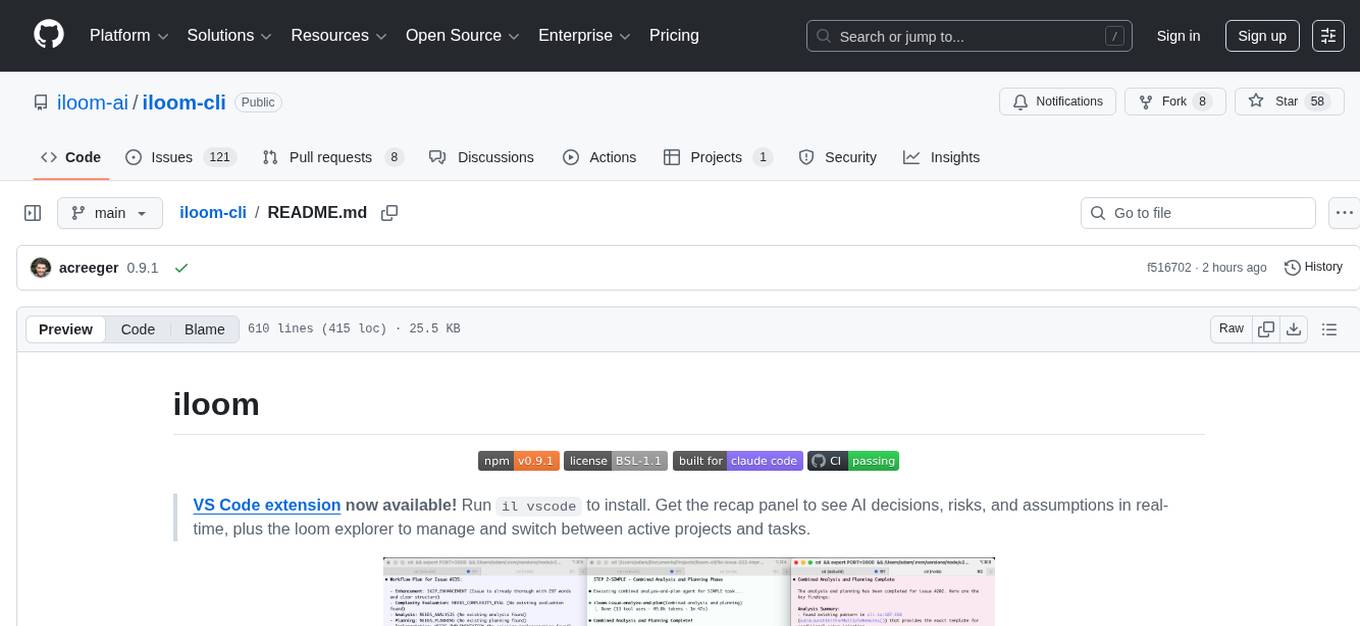
iloom-cli
iloom is a tool designed to streamline AI-assisted development by focusing on maintaining alignment between human developers and AI agents. It treats context as a first-class concern, persisting AI reasoning in issue comments rather than temporary chats. The tool allows users to collaborate with AI agents in an isolated environment, switch between complex features without losing context, document AI decisions publicly, and capture key insights and lessons learned from AI sessions. iloom is not just a tool for managing git worktrees, but a control plane for maintaining alignment between users and their AI assistants.
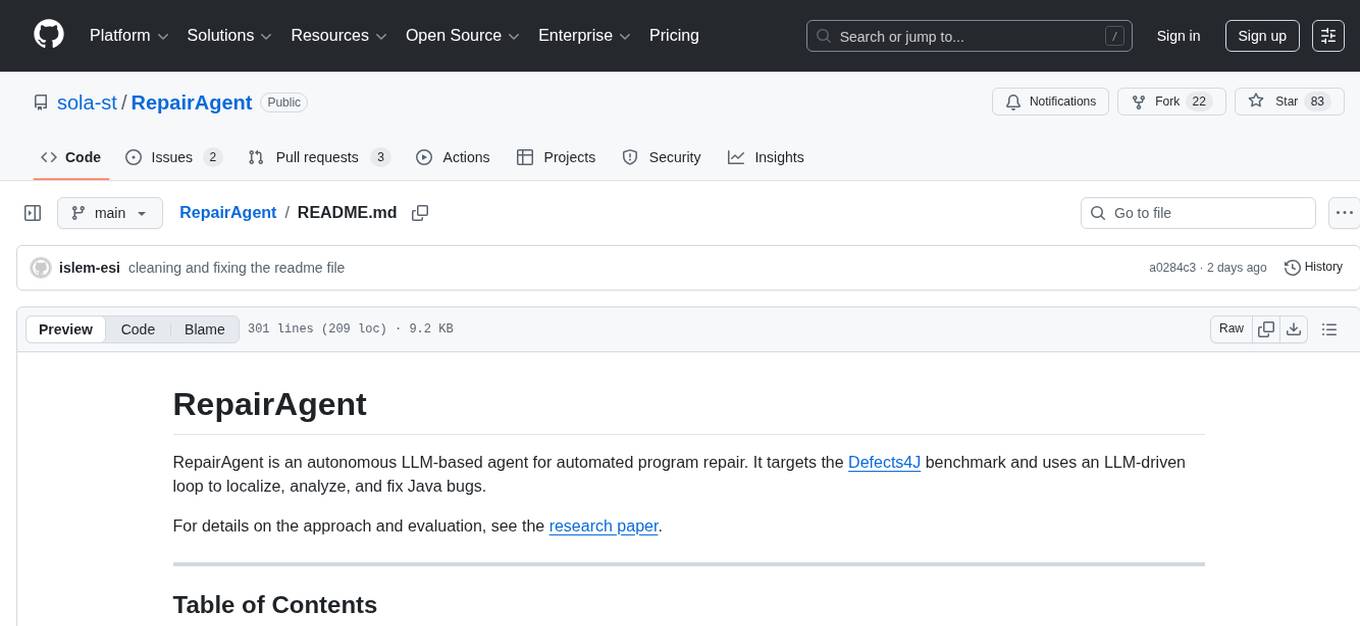
RepairAgent
RepairAgent is an autonomous LLM-based agent for automated program repair targeting the Defects4J benchmark. It uses an LLM-driven loop to localize, analyze, and fix Java bugs. The tool requires Docker, VS Code with Dev Containers extension, OpenAI API key, disk space of ~40 GB, and internet access. Users can get started with RepairAgent using either VS Code Dev Container or Docker Image. Running RepairAgent involves checking out the buggy project version, autonomous bug analysis, fix candidate generation, and testing against the project's test suite. Users can configure hyperparameters for budget control, repetition handling, commands limit, and external fix strategy. The tool provides output structure, experiment overview, individual analysis scripts, and data on fixed bugs from the Defects4J dataset.
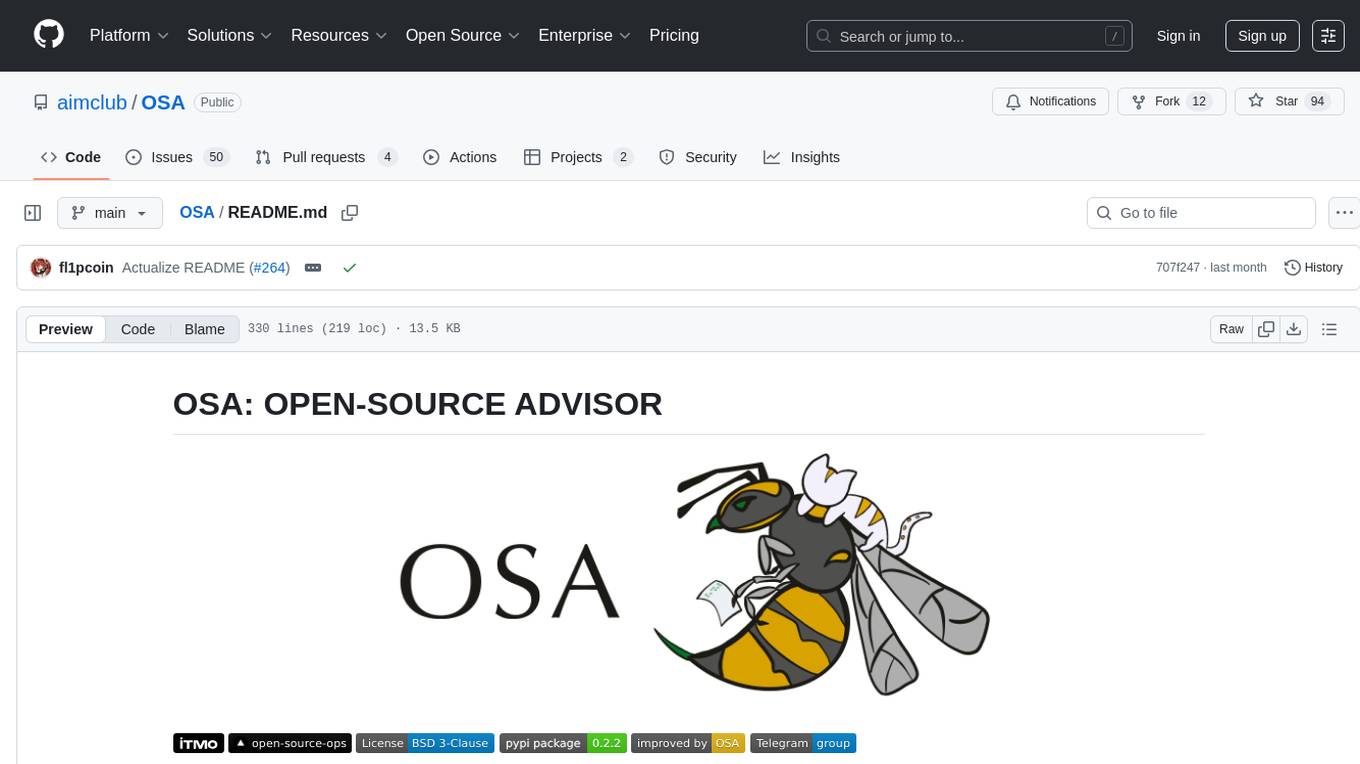
OSA
OSA (Open-Source-Advisor) is a tool designed to improve the quality of scientific open source projects by automating the generation of README files, documentation, CI/CD scripts, and providing advice and recommendations for repositories. It supports various LLMs accessible via API, local servers, or osa_bot hosted on ITMO servers. OSA is currently under development with features like README file generation, documentation generation, automatic implementation of changes, LLM integration, and GitHub Action Workflow generation. It requires Python 3.10 or higher and tokens for GitHub/GitLab/Gitverse and LLM API key. Users can install OSA using PyPi or build from source, and run it using CLI commands or Docker containers.
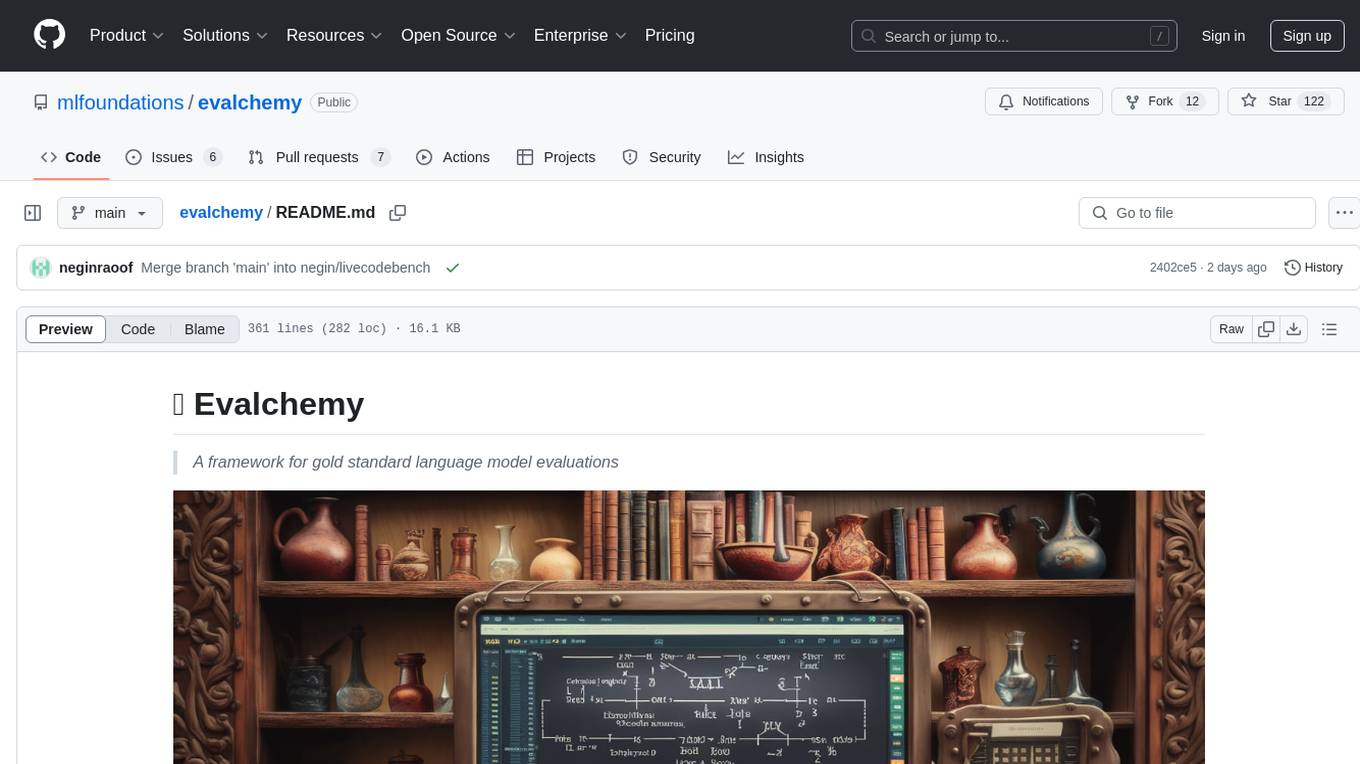
evalchemy
Evalchemy is a unified and easy-to-use toolkit for evaluating language models, focusing on post-trained models. It integrates multiple existing benchmarks such as RepoBench, AlpacaEval, and ZeroEval. Key features include unified installation, parallel evaluation, simplified usage, and results management. Users can run various benchmarks with a consistent command-line interface and track results locally or integrate with a database for systematic tracking and leaderboard submission.
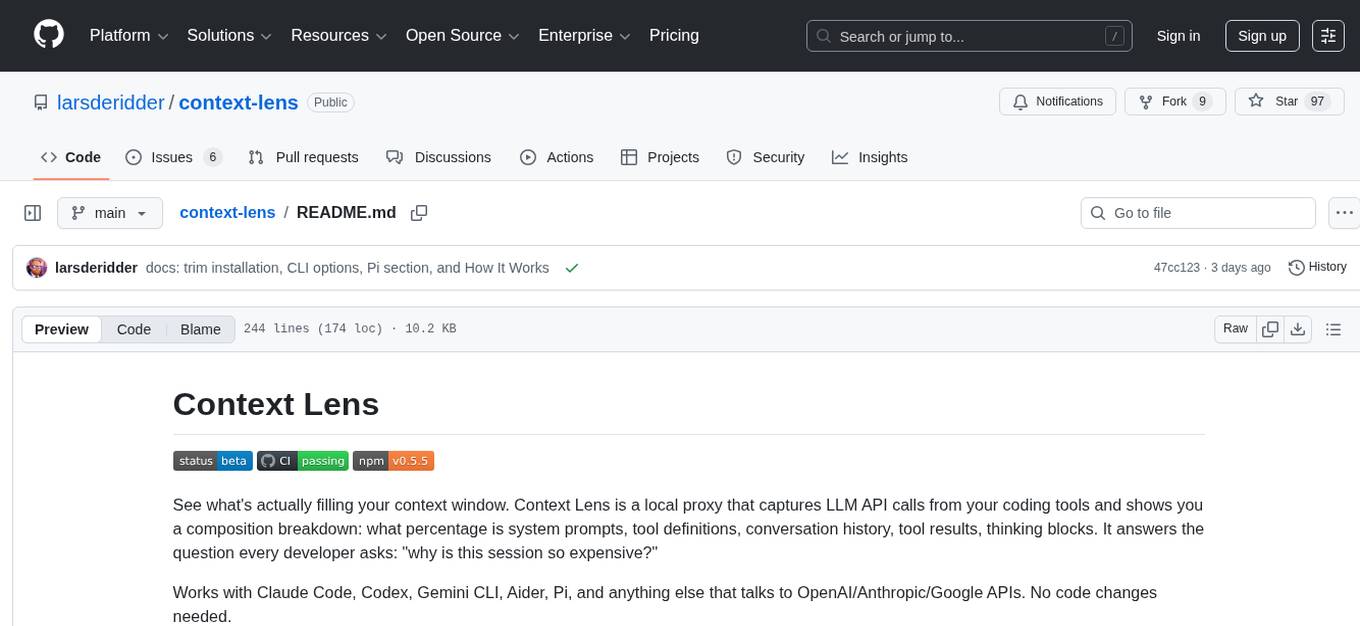
context-lens
Context Lens is a local proxy tool that captures LLM API calls from coding tools to provide a breakdown of context composition, including system prompts, tool definitions, conversation history, tool results, and thinking blocks. It helps developers understand why coding sessions may be resource-intensive without requiring any code changes. The tool works with various coding tools like Claude Code, Codex, Gemini CLI, Aider, and Pi, interacting with OpenAI, Anthropic, and Google APIs. Context Lens offers a visual treemap breakdown, cost tracking, conversation threading, agent breakdown, timeline visualization, context diff analysis, findings flags, auto-detection of coding tools, LHAR export, state persistence, and streaming support, all running locally for privacy and control.
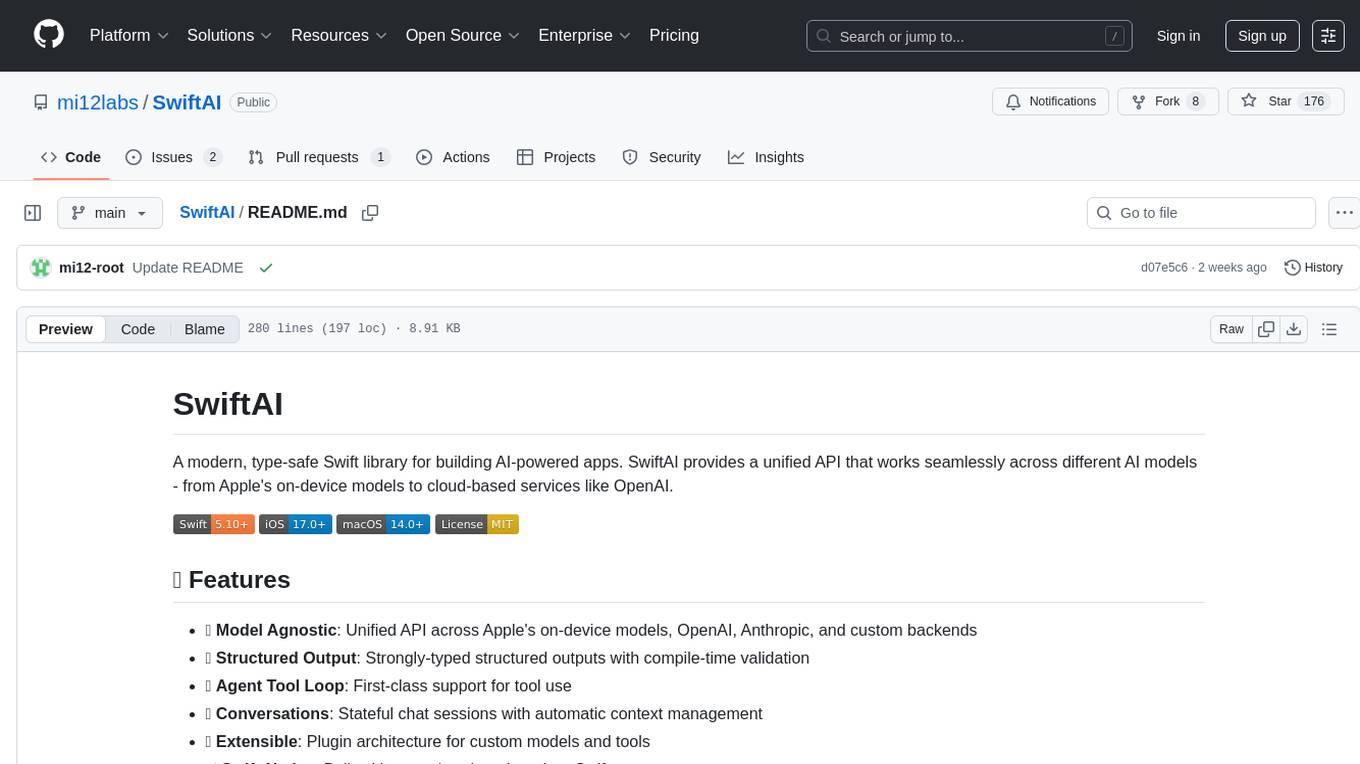
SwiftAI
SwiftAI is a modern, type-safe Swift library for building AI-powered apps. It provides a unified API that works seamlessly across different AI models, including Apple's on-device models and cloud-based services like OpenAI. With features like model agnosticism, structured output, agent tool loop, conversations, extensibility, and Swift-native design, SwiftAI offers a powerful toolset for developers to integrate AI capabilities into their applications. The library supports easy installation via Swift Package Manager and offers detailed guidance on getting started, structured responses, tool use, model switching, conversations, and advanced constraints. SwiftAI aims to simplify AI integration by providing a type-safe and versatile solution for various AI tasks.
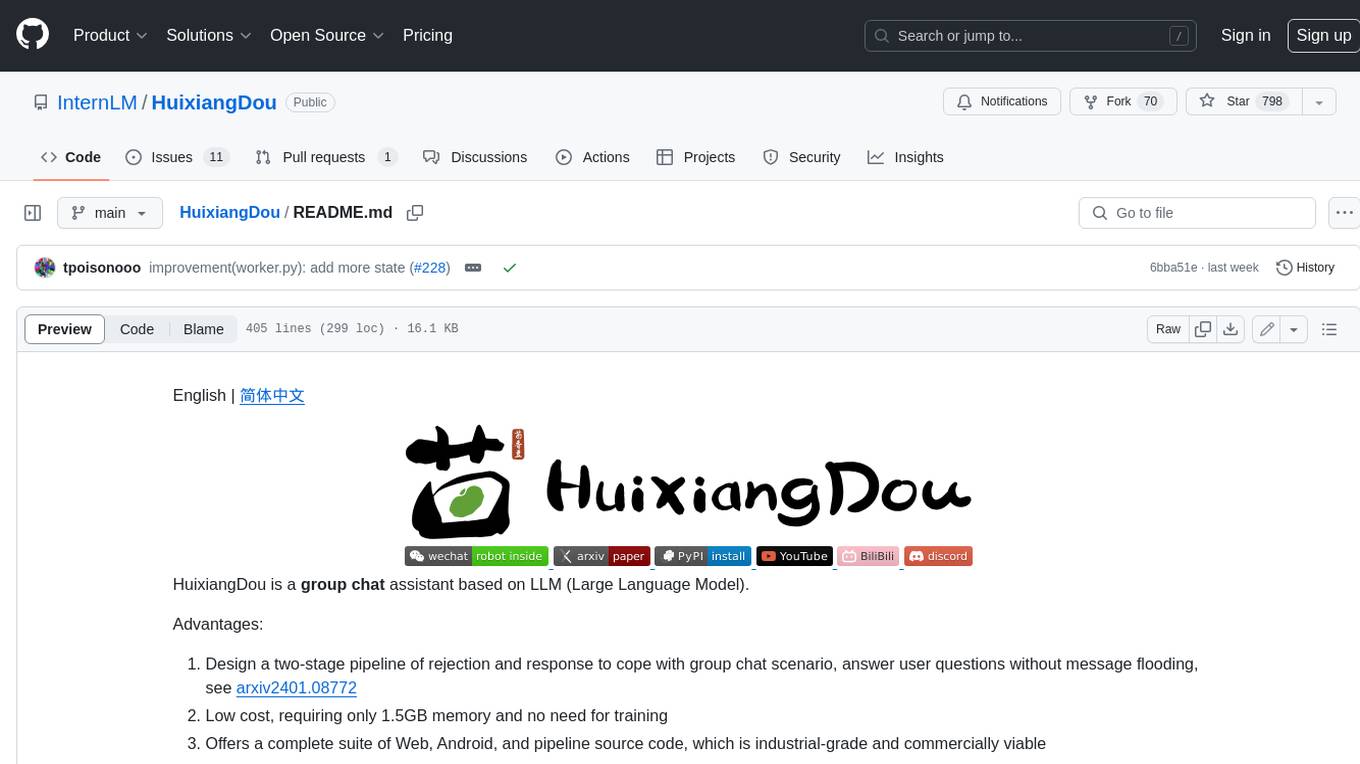
HuixiangDou
HuixiangDou is a **group chat** assistant based on LLM (Large Language Model). Advantages: 1. Design a two-stage pipeline of rejection and response to cope with group chat scenario, answer user questions without message flooding, see arxiv2401.08772 2. Low cost, requiring only 1.5GB memory and no need for training 3. Offers a complete suite of Web, Android, and pipeline source code, which is industrial-grade and commercially viable Check out the scenes in which HuixiangDou are running and join WeChat Group to try AI assistant inside. If this helps you, please give it a star ⭐

skyvern
Skyvern automates browser-based workflows using LLMs and computer vision. It provides a simple API endpoint to fully automate manual workflows, replacing brittle or unreliable automation solutions. Traditional approaches to browser automations required writing custom scripts for websites, often relying on DOM parsing and XPath-based interactions which would break whenever the website layouts changed. Instead of only relying on code-defined XPath interactions, Skyvern adds computer vision and LLMs to the mix to parse items in the viewport in real-time, create a plan for interaction and interact with them. This approach gives us a few advantages: 1. Skyvern can operate on websites it’s never seen before, as it’s able to map visual elements to actions necessary to complete a workflow, without any customized code 2. Skyvern is resistant to website layout changes, as there are no pre-determined XPaths or other selectors our system is looking for while trying to navigate 3. Skyvern leverages LLMs to reason through interactions to ensure we can cover complex situations. Examples include: 1. If you wanted to get an auto insurance quote from Geico, the answer to a common question “Were you eligible to drive at 18?” could be inferred from the driver receiving their license at age 16 2. If you were doing competitor analysis, it’s understanding that an Arnold Palmer 22 oz can at 7/11 is almost definitely the same product as a 23 oz can at Gopuff (even though the sizes are slightly different, which could be a rounding error!) Want to see examples of Skyvern in action? Jump to #real-world-examples-of- skyvern
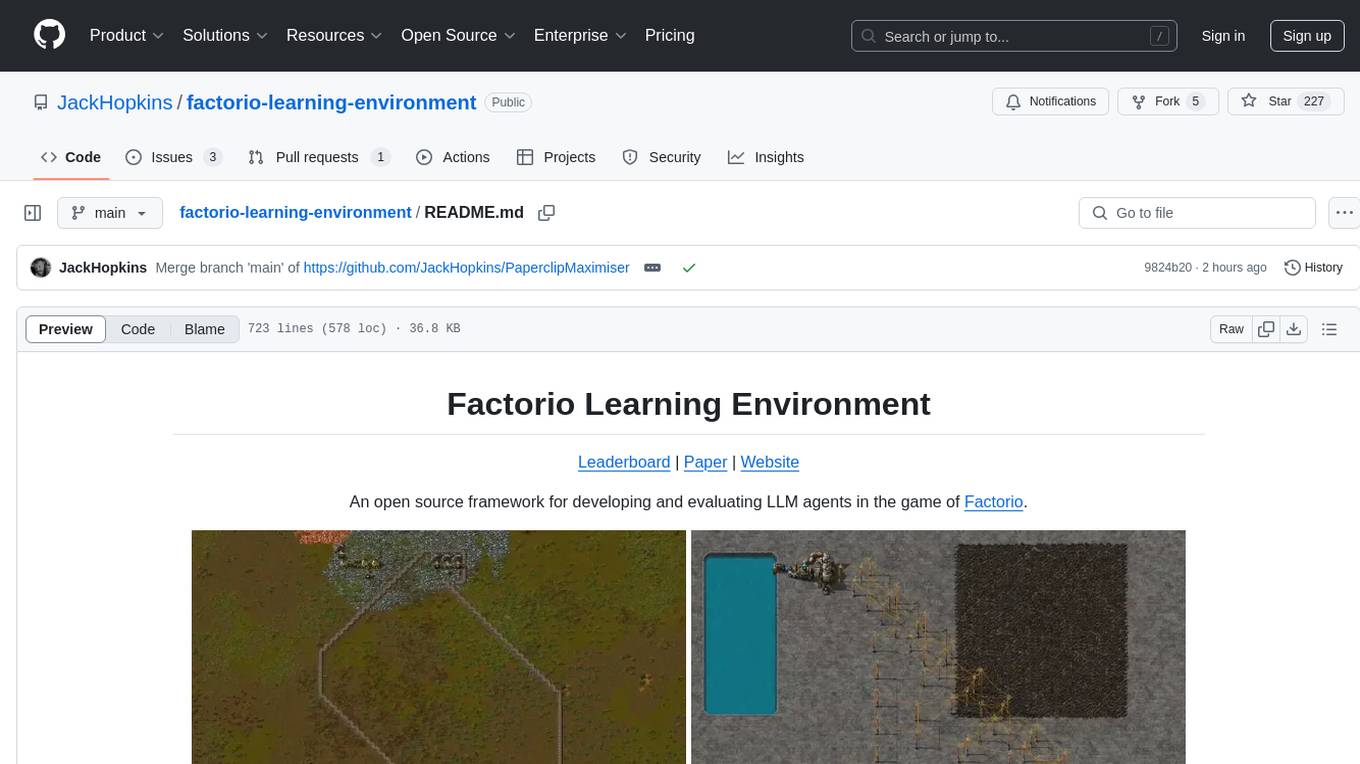
factorio-learning-environment
Factorio Learning Environment is an open source framework designed for developing and evaluating LLM agents in the game of Factorio. It provides two settings: Lab-play with structured tasks and Open-play for building large factories. Results show limitations in spatial reasoning and automation strategies. Agents interact with the environment through code synthesis, observation, action, and feedback. Tools are provided for game actions and state representation. Agents operate in episodes with observation, planning, and action execution. Tasks specify agent goals and are implemented in JSON files. The project structure includes directories for agents, environment, cluster, data, docs, eval, and more. A database is used for checkpointing agent steps. Benchmarks show performance metrics for different configurations.
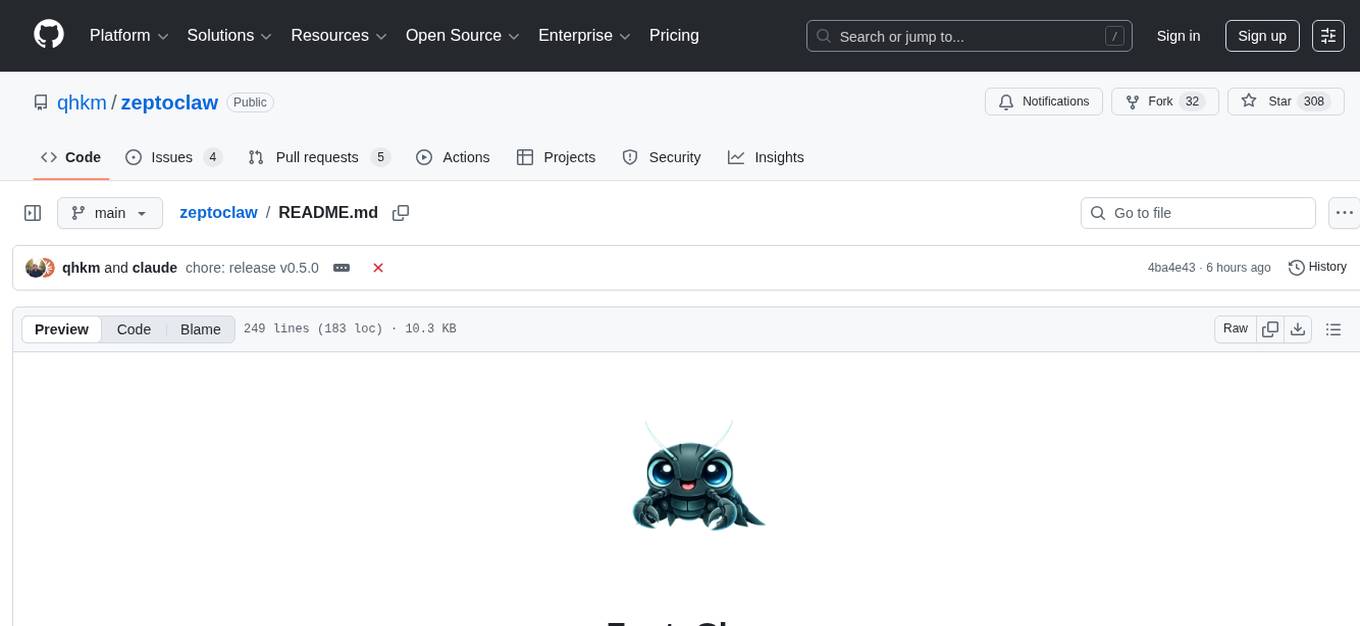
zeptoclaw
ZeptoClaw is an ultra-lightweight personal AI assistant that offers a compact Rust binary with 29 tools, 8 channels, 9 providers, and container isolation. It focuses on integrations, security, and size discipline without compromising on performance. With features like container isolation, prompt injection detection, secret leak scanner, policy engine, input validator, and more, ZeptoClaw ensures secure AI agent execution. It supports migration from OpenClaw, deployment on various platforms, and configuration of LLM providers. ZeptoClaw is designed for efficient AI assistance with minimal resource consumption and maximum security.
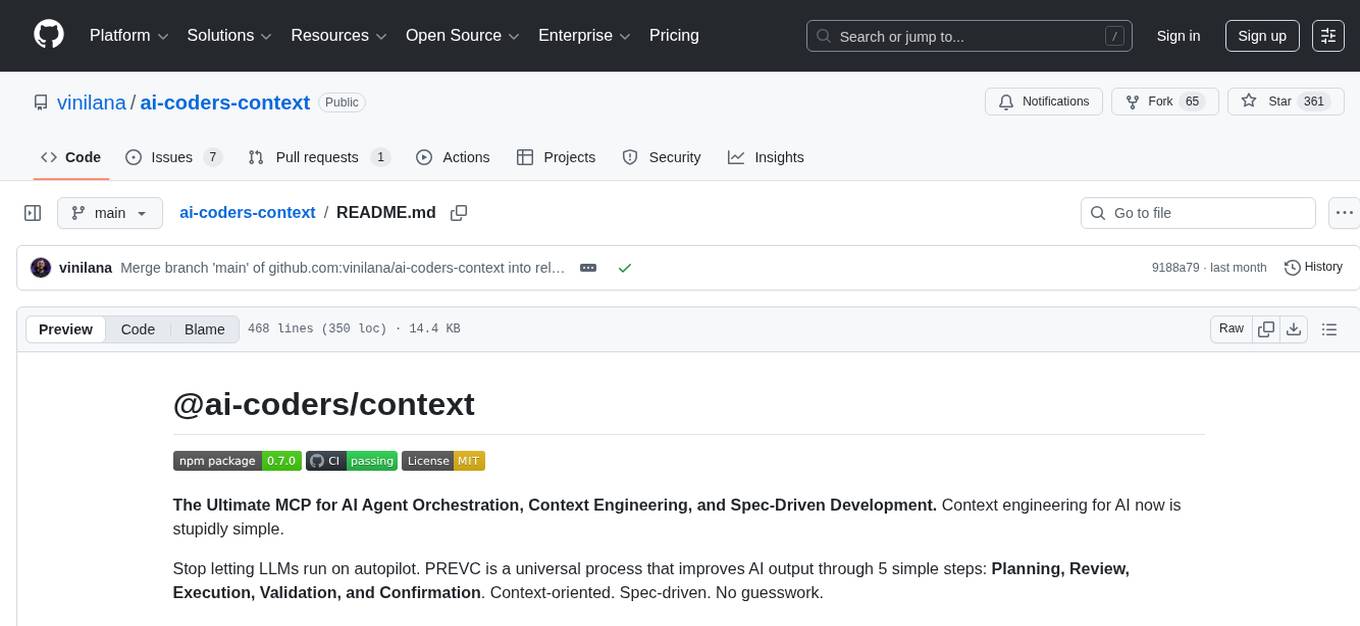
ai-coders-context
The @ai-coders/context repository provides the Ultimate MCP for AI Agent Orchestration, Context Engineering, and Spec-Driven Development. It simplifies context engineering for AI by offering a universal process called PREVC, which consists of Planning, Review, Execution, Validation, and Confirmation steps. The tool aims to address the problem of context fragmentation by introducing a single `.context/` directory that works universally across different tools. It enables users to create structured documentation, generate agent playbooks, manage workflows, provide on-demand expertise, and sync across various AI tools. The tool follows a structured, spec-driven development approach to improve AI output quality and ensure reproducible results across projects.
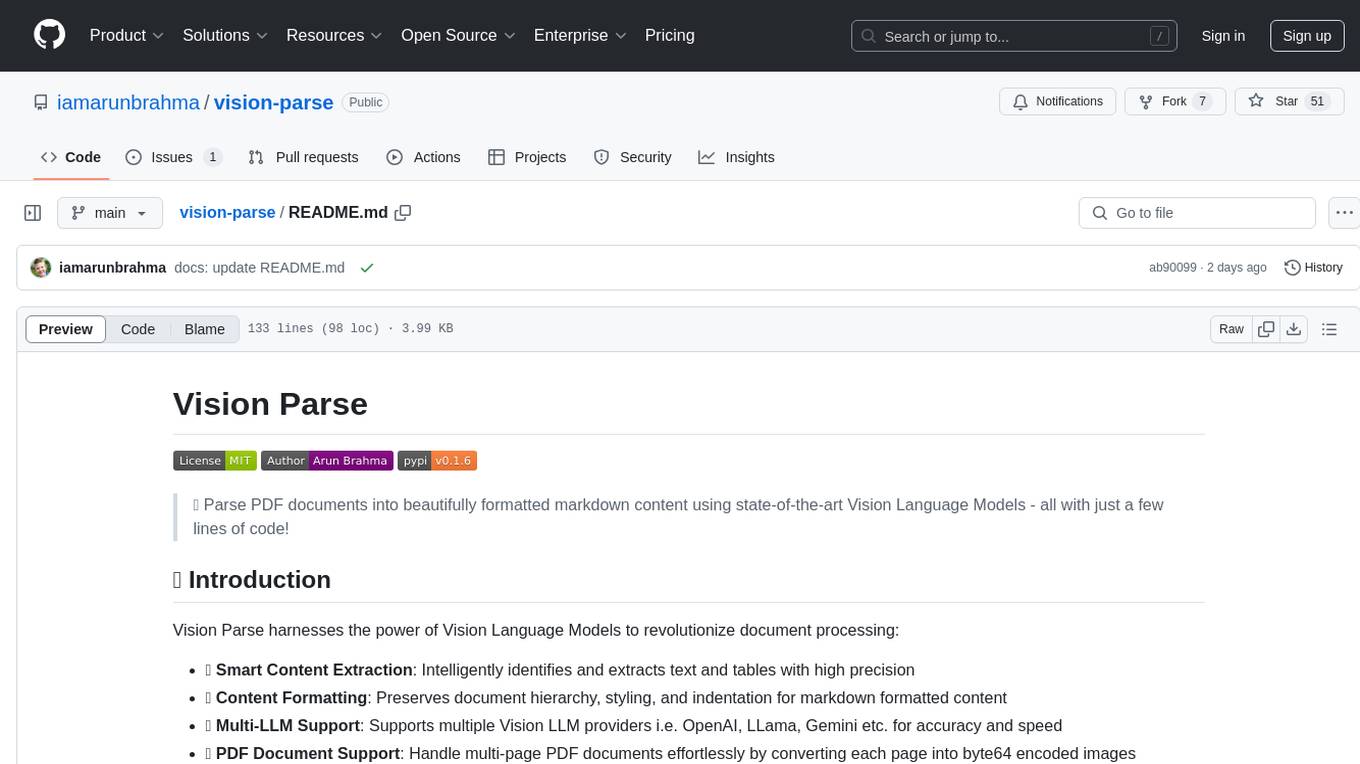
vision-parse
Vision Parse is a tool that leverages Vision Language Models to parse PDF documents into beautifully formatted markdown content. It offers smart content extraction, content formatting, multi-LLM support, PDF document support, and local model hosting using Ollama. Users can easily convert PDFs to markdown with high precision and preserve document hierarchy and styling. The tool supports multiple Vision LLM providers like OpenAI, LLama, and Gemini for accuracy and speed, making document processing efficient and effortless.
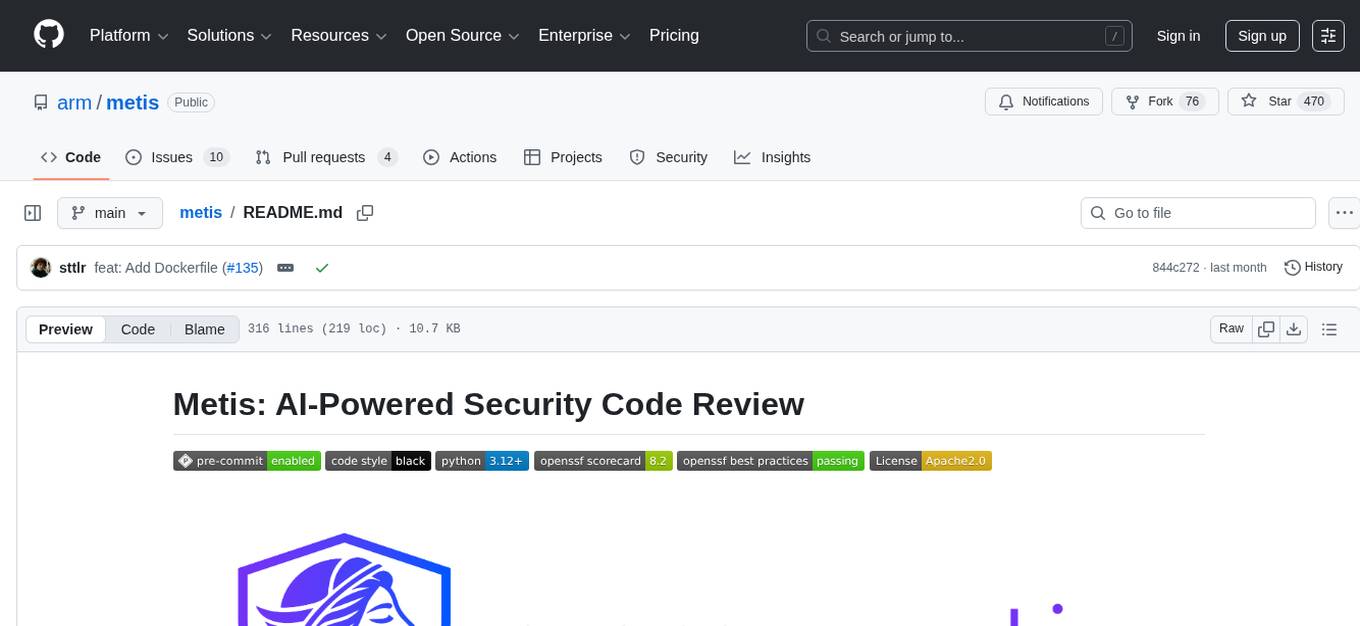
metis
Metis is an open-source, AI-driven tool for deep security code review, created by Arm's Product Security Team. It helps engineers detect subtle vulnerabilities, improve secure coding practices, and reduce review fatigue. Metis uses LLMs for semantic understanding and reasoning, RAG for context-aware reviews, and supports multiple languages and vector store backends. It provides a plugin-friendly and extensible architecture, named after the Greek goddess of wisdom, Metis. The tool is designed for large, complex, or legacy codebases where traditional tooling falls short.
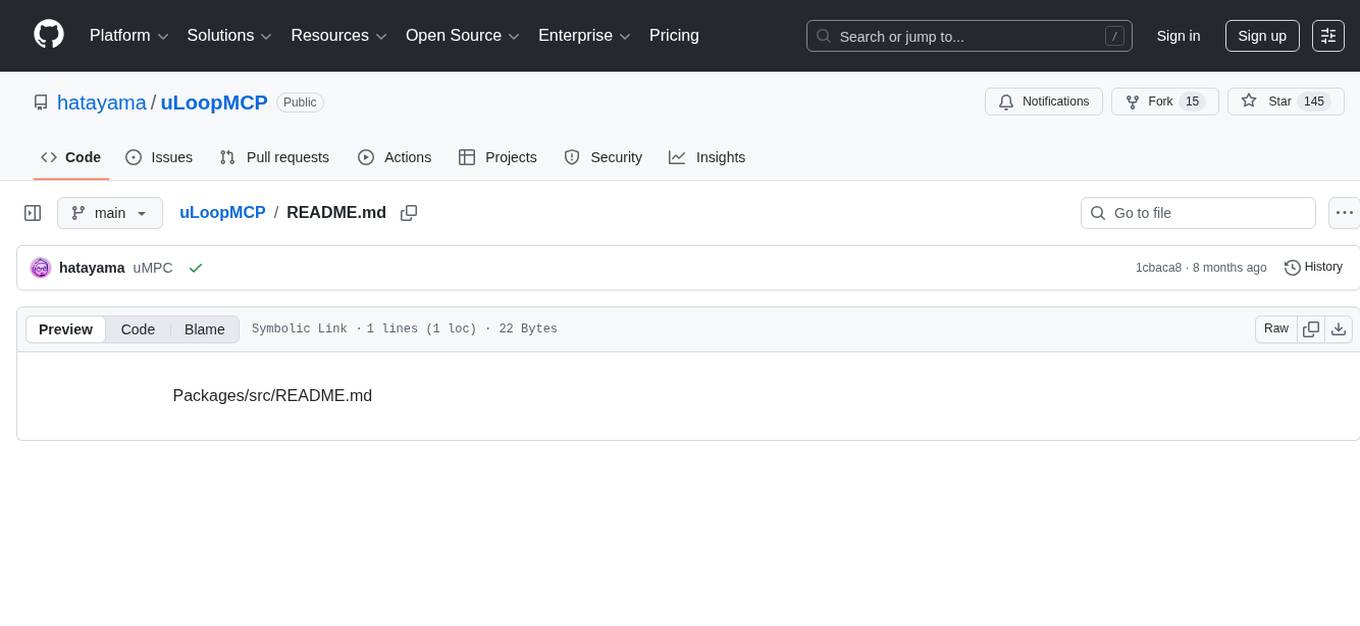
uLoopMCP
uLoopMCP is a Unity integration tool designed to let AI drive your Unity project forward with minimal human intervention. It provides a 'self-hosted development loop' where an AI can compile, run tests, inspect logs, and fix issues using tools like compile, run-tests, get-logs, and clear-console. It also allows AI to operate the Unity Editor itself—creating objects, calling menu items, inspecting scenes, and refining UI layouts from screenshots via tools like execute-dynamic-code, execute-menu-item, and capture-window. The tool enables AI-driven development loops to run autonomously inside existing Unity projects.

xFasterTransformer
xFasterTransformer is an optimized solution for Large Language Models (LLMs) on the X86 platform, providing high performance and scalability for inference on mainstream LLM models. It offers C++ and Python APIs for easy integration, along with example codes and benchmark scripts. Users can prepare models in a different format, convert them, and use the APIs for tasks like encoding input prompts, generating token ids, and serving inference requests. The tool supports various data types and models, and can run in single or multi-rank modes using MPI. A web demo based on Gradio is available for popular LLM models like ChatGLM and Llama2. Benchmark scripts help evaluate model inference performance quickly, and MLServer enables serving with REST and gRPC interfaces.
For similar tasks

paperless-gpt
paperless-gpt is a tool designed to generate accurate and meaningful document titles and tags for paperless-ngx using Large Language Models (LLMs). It supports multiple LLM providers, including OpenAI and Ollama. With paperless-gpt, you can streamline your document management by automatically suggesting appropriate titles and tags based on the content of your scanned documents. The tool offers features like multiple LLM support, customizable prompts, easy integration with paperless-ngx, user-friendly interface for reviewing and applying suggestions, dockerized deployment, automatic document processing, and an experimental OCR feature.

classifai
Supercharge WordPress Content Workflows and Engagement with Artificial Intelligence. Tap into leading cloud-based services like OpenAI, Microsoft Azure AI, Google Gemini and IBM Watson to augment your WordPress-powered websites. Publish content faster while improving SEO performance and increasing audience engagement. ClassifAI integrates Artificial Intelligence and Machine Learning technologies to lighten your workload and eliminate tedious tasks, giving you more time to create original content that matters.

AI-in-a-Box
AI-in-a-Box is a curated collection of solution accelerators that can help engineers establish their AI/ML environments and solutions rapidly and with minimal friction, while maintaining the highest standards of quality and efficiency. It provides essential guidance on the responsible use of AI and LLM technologies, specific security guidance for Generative AI (GenAI) applications, and best practices for scaling OpenAI applications within Azure. The available accelerators include: Azure ML Operationalization in-a-box, Edge AI in-a-box, Doc Intelligence in-a-box, Image and Video Analysis in-a-box, Cognitive Services Landing Zone in-a-box, Semantic Kernel Bot in-a-box, NLP to SQL in-a-box, Assistants API in-a-box, and Assistants API Bot in-a-box.
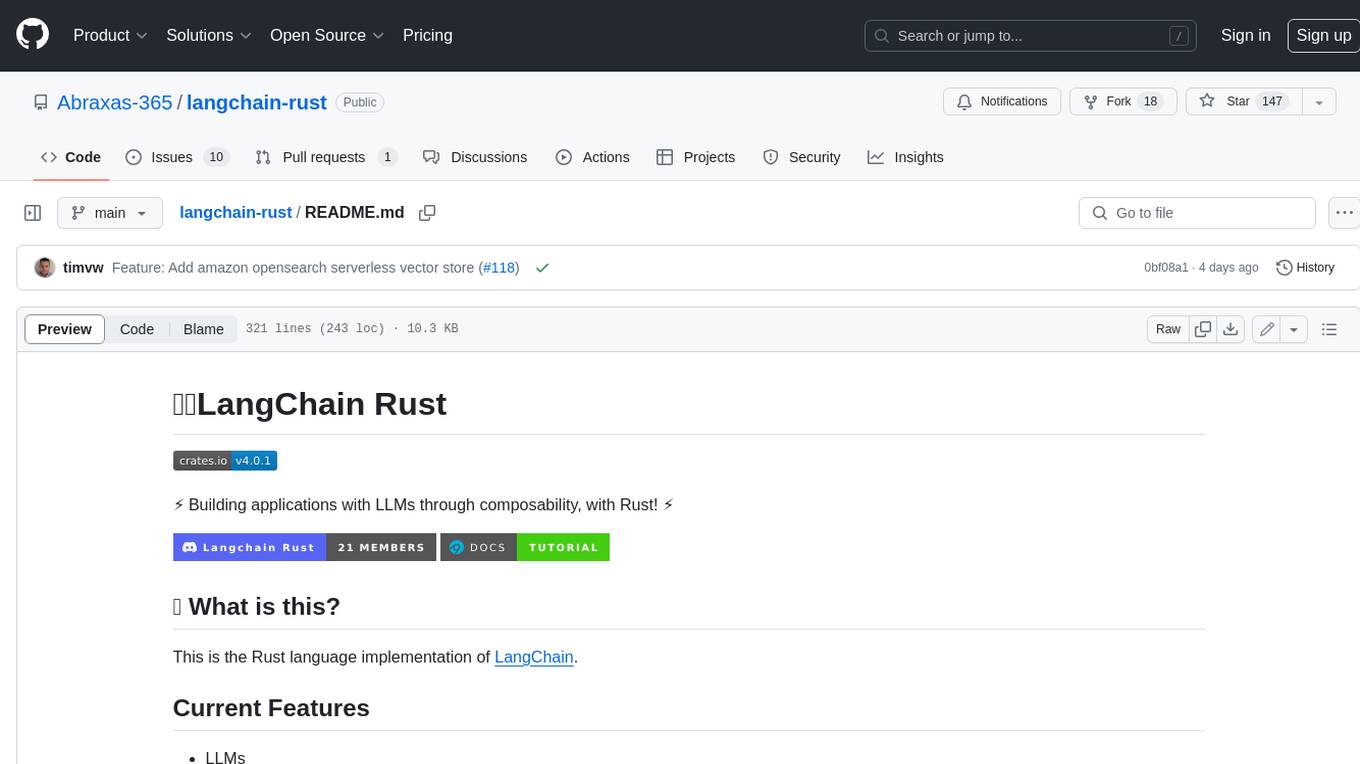
langchain-rust
LangChain Rust is a library for building applications with Large Language Models (LLMs) through composability. It provides a set of tools and components that can be used to create conversational agents, document loaders, and other applications that leverage LLMs. LangChain Rust supports a variety of LLMs, including OpenAI, Azure OpenAI, Ollama, and Anthropic Claude. It also supports a variety of embeddings, vector stores, and document loaders. LangChain Rust is designed to be easy to use and extensible, making it a great choice for developers who want to build applications with LLMs.
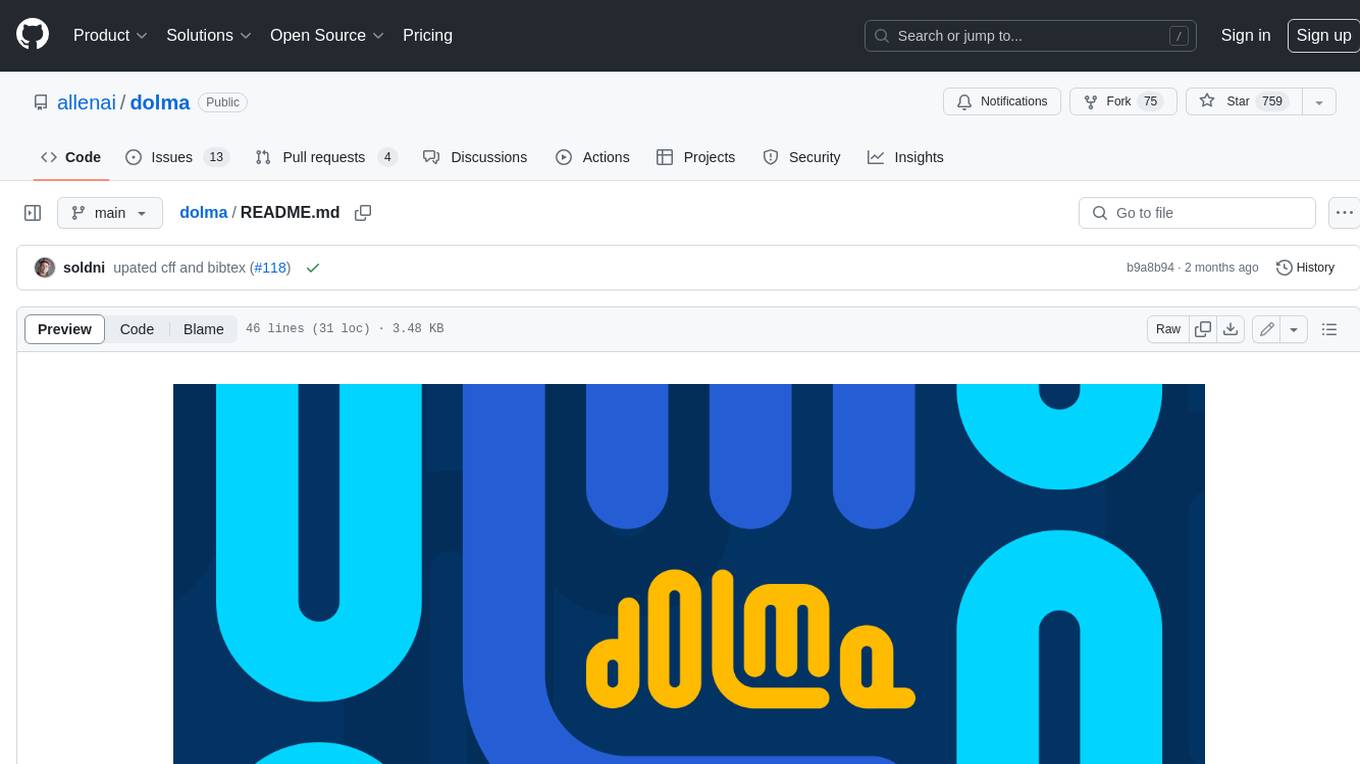
dolma
Dolma is a dataset and toolkit for curating large datasets for (pre)-training ML models. The dataset consists of 3 trillion tokens from a diverse mix of web content, academic publications, code, books, and encyclopedic materials. The toolkit provides high-performance, portable, and extensible tools for processing, tagging, and deduplicating documents. Key features of the toolkit include built-in taggers, fast deduplication, and cloud support.
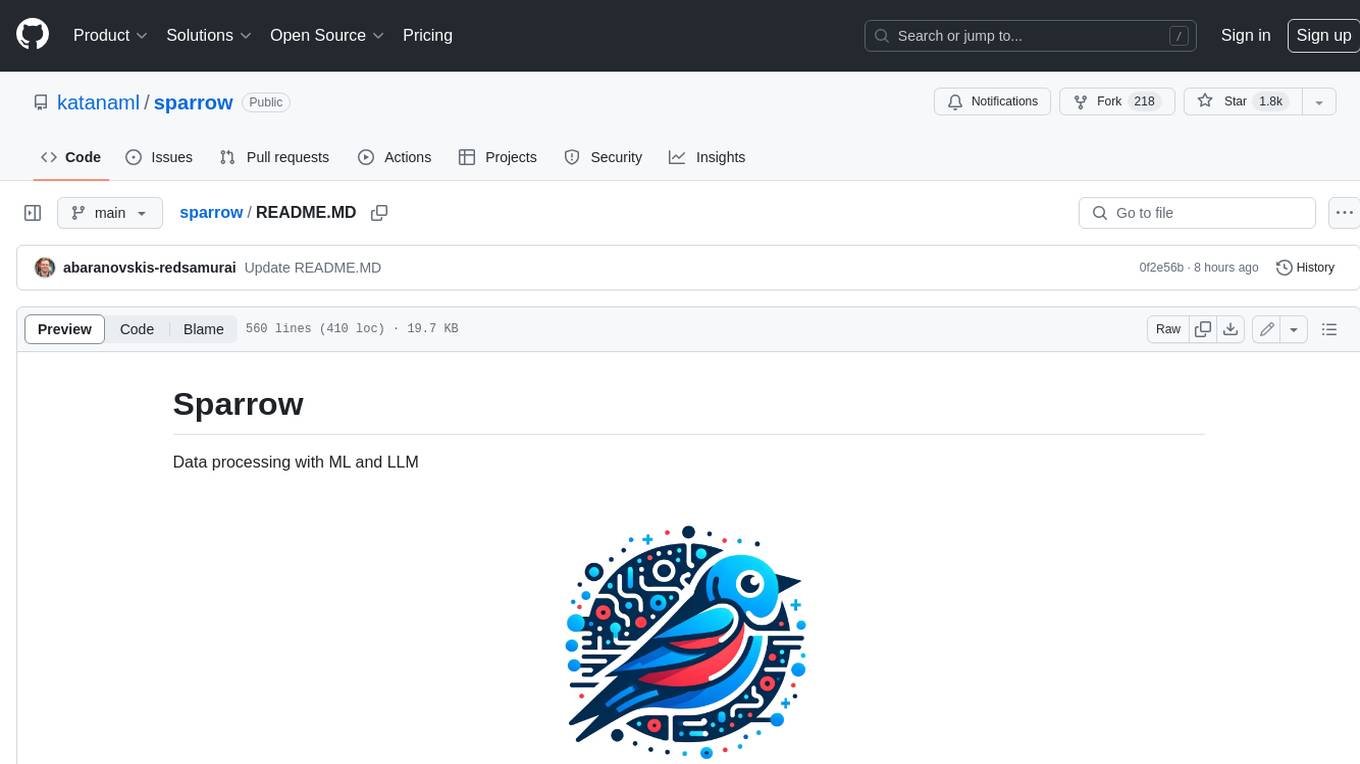
sparrow
Sparrow is an innovative open-source solution for efficient data extraction and processing from various documents and images. It seamlessly handles forms, invoices, receipts, and other unstructured data sources. Sparrow stands out with its modular architecture, offering independent services and pipelines all optimized for robust performance. One of the critical functionalities of Sparrow - pluggable architecture. You can easily integrate and run data extraction pipelines using tools and frameworks like LlamaIndex, Haystack, or Unstructured. Sparrow enables local LLM data extraction pipelines through Ollama or Apple MLX. With Sparrow solution you get API, which helps to process and transform your data into structured output, ready to be integrated with custom workflows. Sparrow Agents - with Sparrow you can build independent LLM agents, and use API to invoke them from your system. **List of available agents:** * **llamaindex** - RAG pipeline with LlamaIndex for PDF processing * **vllamaindex** - RAG pipeline with LLamaIndex multimodal for image processing * **vprocessor** - RAG pipeline with OCR and LlamaIndex for image processing * **haystack** - RAG pipeline with Haystack for PDF processing * **fcall** - Function call pipeline * **unstructured-light** - RAG pipeline with Unstructured and LangChain, supports PDF and image processing * **unstructured** - RAG pipeline with Weaviate vector DB query, Unstructured and LangChain, supports PDF and image processing * **instructor** - RAG pipeline with Unstructured and Instructor libraries, supports PDF and image processing. Works great for JSON response generation
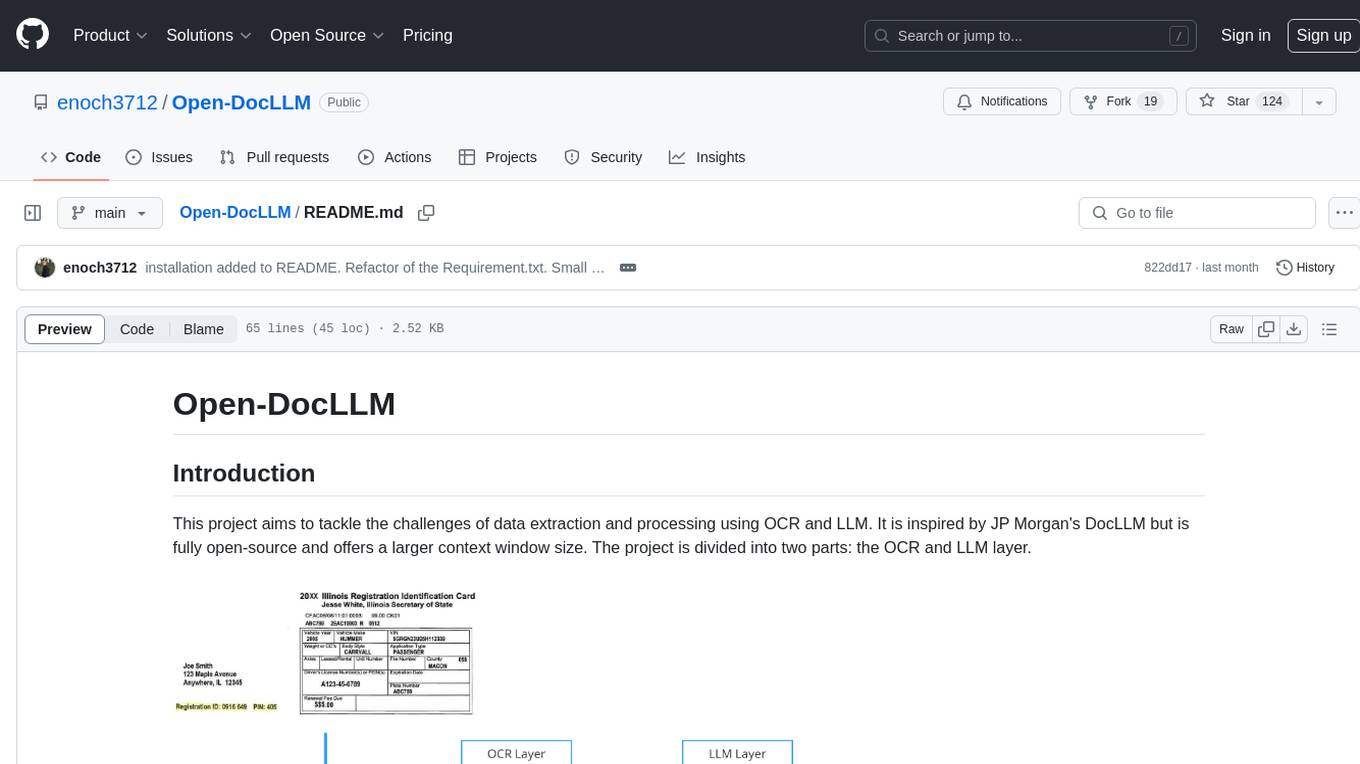
Open-DocLLM
Open-DocLLM is an open-source project that addresses data extraction and processing challenges using OCR and LLM technologies. It consists of two main layers: OCR for reading document content and LLM for extracting specific content in a structured manner. The project offers a larger context window size compared to JP Morgan's DocLLM and integrates tools like Tesseract OCR and Mistral for efficient data analysis. Users can run the models on-premises using LLM studio or Ollama, and the project includes a FastAPI app for testing purposes.
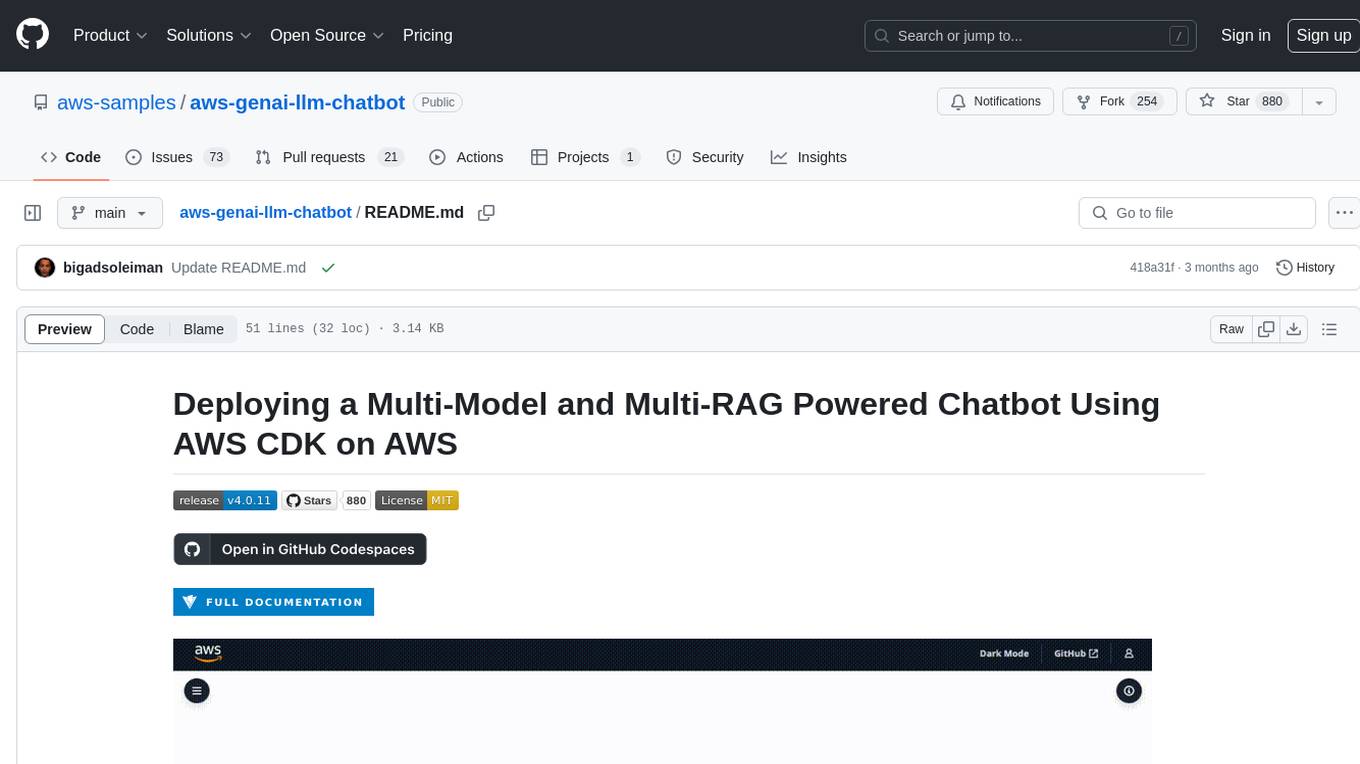
aws-genai-llm-chatbot
This repository provides code to deploy a chatbot powered by Multi-Model and Multi-RAG using AWS CDK on AWS. Users can experiment with various Large Language Models and Multimodal Language Models from different providers. The solution supports Amazon Bedrock, Amazon SageMaker self-hosted models, and third-party providers via API. It also offers additional resources like AWS Generative AI CDK Constructs and Project Lakechain for building generative AI solutions and document processing. The roadmap and authors are listed, along with contributors. The library is licensed under the MIT-0 License with information on changelog, code of conduct, and contributing guidelines. A legal disclaimer advises users to conduct their own assessment before using the content for production purposes.
For similar jobs

LLMStack
LLMStack is a no-code platform for building generative AI agents, workflows, and chatbots. It allows users to connect their own data, internal tools, and GPT-powered models without any coding experience. LLMStack can be deployed to the cloud or on-premise and can be accessed via HTTP API or triggered from Slack or Discord.

daily-poetry-image
Daily Chinese ancient poetry and AI-generated images powered by Bing DALL-E-3. GitHub Action triggers the process automatically. Poetry is provided by Today's Poem API. The website is built with Astro.

exif-photo-blog
EXIF Photo Blog is a full-stack photo blog application built with Next.js, Vercel, and Postgres. It features built-in authentication, photo upload with EXIF extraction, photo organization by tag, infinite scroll, light/dark mode, automatic OG image generation, a CMD-K menu with photo search, experimental support for AI-generated descriptions, and support for Fujifilm simulations. The application is easy to deploy to Vercel with just a few clicks and can be customized with a variety of environment variables.

SillyTavern
SillyTavern is a user interface you can install on your computer (and Android phones) that allows you to interact with text generation AIs and chat/roleplay with characters you or the community create. SillyTavern is a fork of TavernAI 1.2.8 which is under more active development and has added many major features. At this point, they can be thought of as completely independent programs.

Twitter-Insight-LLM
This project enables you to fetch liked tweets from Twitter (using Selenium), save it to JSON and Excel files, and perform initial data analysis and image captions. This is part of the initial steps for a larger personal project involving Large Language Models (LLMs).

AISuperDomain
Aila Desktop Application is a powerful tool that integrates multiple leading AI models into a single desktop application. It allows users to interact with various AI models simultaneously, providing diverse responses and insights to their inquiries. With its user-friendly interface and customizable features, Aila empowers users to engage with AI seamlessly and efficiently. Whether you're a researcher, student, or professional, Aila can enhance your AI interactions and streamline your workflow.

ChatGPT-On-CS
This project is an intelligent dialogue customer service tool based on a large model, which supports access to platforms such as WeChat, Qianniu, Bilibili, Douyin Enterprise, Douyin, Doudian, Weibo chat, Xiaohongshu professional account operation, Xiaohongshu, Zhihu, etc. You can choose GPT3.5/GPT4.0/ Lazy Treasure Box (more platforms will be supported in the future), which can process text, voice and pictures, and access external resources such as operating systems and the Internet through plug-ins, and support enterprise AI applications customized based on their own knowledge base.

obs-localvocal
LocalVocal is a live-streaming AI assistant plugin for OBS that allows you to transcribe audio speech into text and perform various language processing functions on the text using AI / LLMs (Large Language Models). It's privacy-first, with all data staying on your machine, and requires no GPU, cloud costs, network, or downtime.








